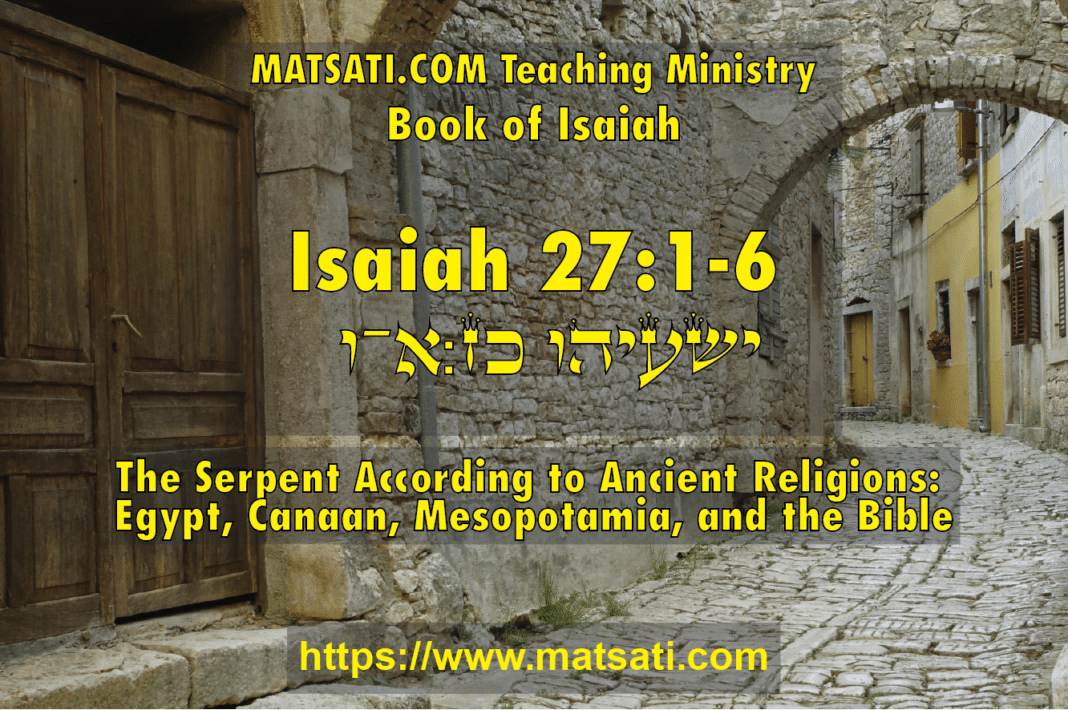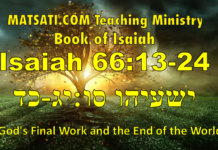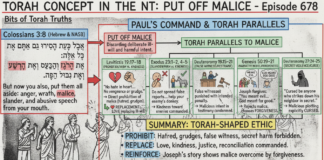Isaiah 27:1-6
The opening verse of Isaiah 27:1-13 speaks of the Leviathan, the Serpent, and so commentators argue over the authenticity and the position of this verse, whether this should have been coupled with Chapter 26 or not. The serpent, נָחָשׁ (nachash) ὄφις (ophis), based upon this verse and that of what we read in the Torah, makes this creature of both land and sea. In the biblical text, the serpent is a symbol with both positive and negative connotations. In the Ancient Near Eastern Context the serpent functioned as a metaphor for a vast array of meanings, including life, fertility, and wisdom, as well as chaos and death.

Mesopotamia
The Enuma Elish describes serpents and dragons engaging in the violent battle between Tiamat (a primordial goddess) and Marduk (Babylon’s patron deity). All the gods rallied to Tiamat, forming a council to prepare for the fight. Among them were “monster-serpents, sharp of tooth, unsparing of fang … roaring dragons she has clothed with terror, has crowned them with haloes, making them like gods”—a description that appears four times (I.133–37; II.20–24; III.24–28, 82–86; ANET, 62–65). In the end, Marduk crushes Tiamat’s skull and splits her body in two in order to form the cosmos. In the Gilgamesh Epic, a serpent thwarts Gilgamesh’s attempt to become immortal. Utnapishtim tells Gilgamesh how to obtain a plant that would give new life. Gilgamesh finds the plant, but the serpent snuffs out its fragrance and carries it away, depriving Gilgamesh of immortality (XI.268–289; ANET, 96). A more benign serpent appears in the Etana legend. This serpent makes a mutually beneficial agreement with an eagle, but the eagle breaks it and destroys the serpent’s young in its nest. When the serpent discovers the damage, it scratches the ground with its claws, weeps before the sun-god Shamash, and asks Shamash to curse the eagle (S. Langdon, Babyloniaca, XII; cited in ANET, 114–15, A-2, lines 4–24). (Logos Factbook)
We note something here in the descriptions of the snake. Here the ancient creature is said to have scratched the ground with its claws. According to the Torah, the snake was cursed to crawl on its belly. This means that God had made it such that the legs of the snake would become nonfunctional, and eventually the species would lose its use of these legs and they would disappear like we see today. Interestingly, there is evidence in the fossil record of snakes having legs, more can be read about this on the National Geographic website linked here. https://www.nationalgeographic.com/science/article/a-fossil-snake-with-four-legs
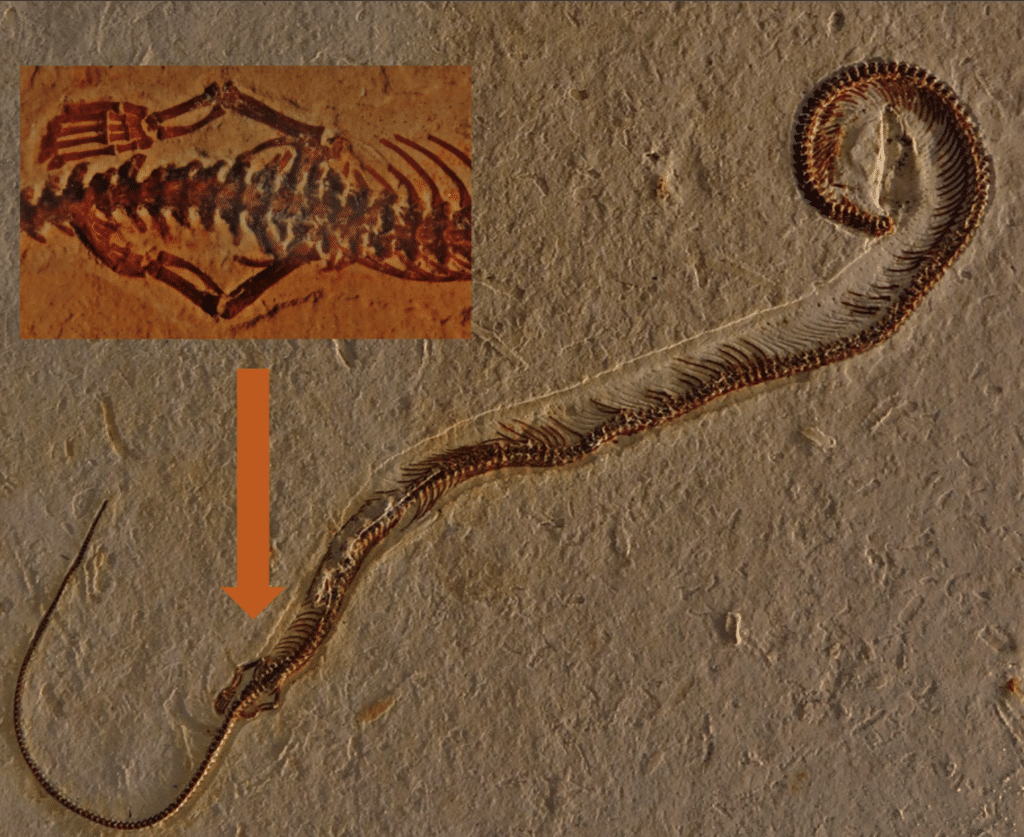

Egypt
In Egyptian texts, serpents represented both benign and malevolent powers. The mythological serpent Apophis, enemy of the sun-god Re, attacked the ritual sailing ship thought to transport Re across the heavens every night while Meḥen, another serpent, protected Re. Apophis existed in the waters of primeval chaos prior to creation and continued to resurface as chaos was repeatedly confronted. On the other hand, the cobra Wadjet was closely linked with the king and defended him by attacking his enemies with its fiery breath. Depicted as an erect cobra with its hood expanded, Wadjet often was attached to the solar disc (Wilkinson, Complete Gods, 220–28). Several biblical texts allude to Pharaoh himself as a great sea monster (Ezekiel 29:3, Isaiah 51:9–11) who was submerged in the sea of reeds, the “sea of extinction” (Batto, Slaying the Dragon, 115–16, 171). (Logos Factbook)
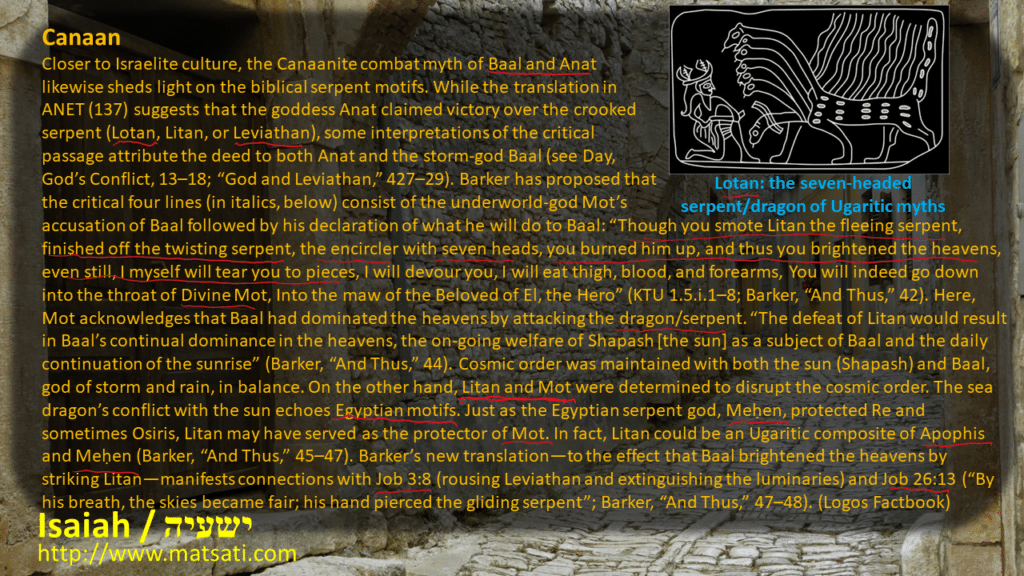
Canaan
Closer to Israelite culture, the Canaanite combat myth of Baal and Anat likewise sheds light on the biblical serpent motifs. While the translation in ANET (137) suggests that the goddess Anat claimed victory over the crooked serpent (Lotan, Litan, or Leviathan), some interpretations of the critical passage attribute the deed to both Anat and the storm-god Baal (see Day, God’s Conflict, 13–18; “God and Leviathan,” 427–29). Barker has proposed that the critical four lines (in italics, below) consist of the underworld-god Mot’s accusation of Baal followed by his declaration of what he will do to Baal: “Though you smote Litan the fleeing serpent, finished off the twisting serpent, the encircler with seven heads, you burned him up, and thus you brightened the heavens, even still, I myself will tear you to pieces, I will devour you, I will eat thigh, blood, and forearms, You will indeed go down into the throat of Divine Mot, Into the maw of the Beloved of El, the Hero” (KTU 1.5.i.1–8; Barker, “And Thus,” 42). Here, Mot acknowledges that Baal had dominated the heavens by attacking the dragon/serpent. “The defeat of Litan would result in Baal’s continual dominance in the heavens, the on-going welfare of Shapash [the sun] as a subject of Baal and the daily continuation of the sunrise” (Barker, “And Thus,” 44). Cosmic order was maintained with both the sun (Shapash) and Baal, god of storm and rain, in balance. On the other hand, Litan and Mot were determined to disrupt the cosmic order. The sea dragon’s conflict with the sun echoes Egyptian motifs. Just as the Egyptian serpent god, Meḥen, protected Re and sometimes Osiris, Litan may have served as the protector of Mot. In fact, Litan could be an Ugaritic composite of Apophis and Meḥen (Barker, “And Thus,” 45–47). Barker’s new translation—to the effect that Baal brightened the heavens by striking Litan—manifests connections with Job 3:8 (rousing Leviathan and extinguishing the luminaries) and Job 26:13 (“By his breath, the skies became fair; his hand pierced the gliding serpent”; Barker, “And Thus,” 47–48). (Logos Factbook)
We note again here the ancient mythology speaks of the serpent having arms that Baal will devour. The fossil record again supports these comments concerning the serpent. We note the biblical account according to the Torah in Bereshit / Genesis 3:14.
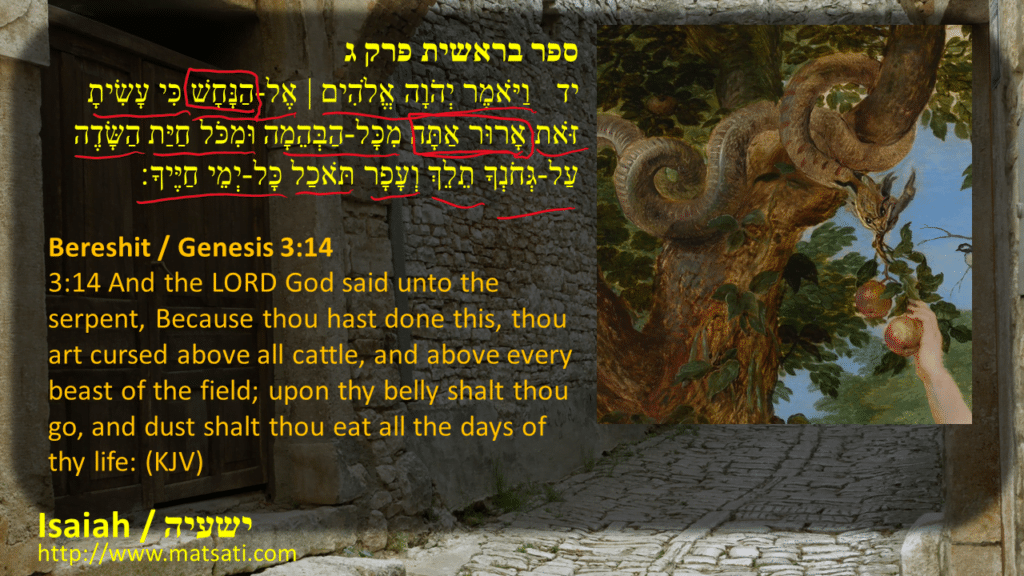
ספר בראשית פרק ג
יד וַיֹּאמֶר יְהֹוָה אֱלֹהִים | אֶל-הַנָּחָשׁ כִּי עָשִֹיתָ זֹּאת אָרוּר אַתָּה מִכָּל-הַבְּהֵמָה וּמִכֹּל חַיַּת הַשָּׂדֶה עַל-גְּחֹנְךָ תֵלֵךְ וְעָפָר תֹּאכַל כָּל-יְמֵי חַיֶּיךָ:
Bereshit / Genesis 3:14
3:14 And the LORD God said unto the serpent, Because thou hast done this, thou art cursed above all cattle, and above every beast of the field; upon thy belly shalt thou go, and dust shalt thou eat all the days of thy life: (KJV)
Here the Lord God cursed the Nakhash (הַנָּחָשׁ, serpent) for what he had done to crawl on its belly. This suggests that the serpent had legs. This is supported again by the fossil record. It is important to note that the commentaries discuss how even though there are descriptions of the serpent in these narratives the borrowing of these accounts from the Babylonian account is not sustainable, especially after the discovery at Ugarit of the defeat of Lotan, a sea monster in the Canaanite belief structure. There is also reported in the Hittite literature of a similar myth of the struggle between the high God and a sea-chaos monster. This appears to have been a widespread belief in the ancient Near East cultures. These cultures may easily have drawn from the actual events that took place that are described according to the Torah in Bereshit / Genesis 3. Prior to the discovery of the Ugaritic literature on this topic, commentators struggled to determine who Isaiah was referring to believing this was a reference possibly to Assyria, Babylonia, or Egypt. Here Isaiah speaks to the sovereignty of God over all. The serpent represents evil, and we are told in the book of Revelation, that ultimately God prevails, how the serpent, that ancient dragon (δράκοντα) is defeated, the Lord God Almighty triumphs in the Messiah Yeshua! Those who keep the faith through the trials and tribulations will join the Lord God in his triumphal victory!
Isaiah opens saying the following according to Isaiah 27:1.
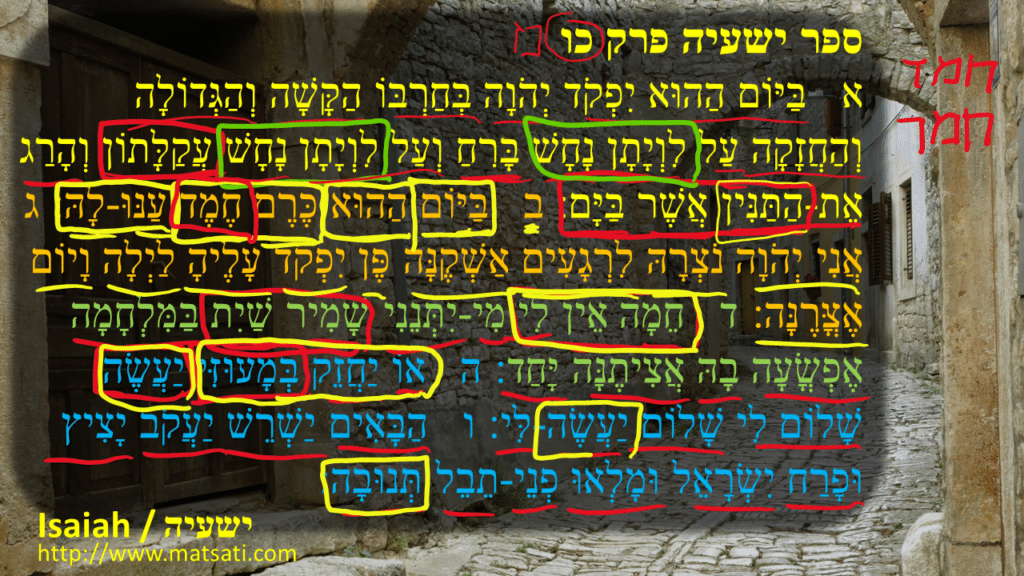
ספר ישעיה פרק כז
א בַּיּוֹם הַהוּא יִפְקֹד יְהֹוָה בְּחַרְבּוֹ הַקָּשָׁה וְהַגְּדוֹלָה וְהַחֲזָקָה עַל לִוְיָתָן נָחָשׁ בָּרִחַ וְעַל לִוְיָתָן נָחָשׁ עֲקַלָּתוֹן וְהָרַג אֶת-הַתַּנִּין אֲשֶׁר בַּיָּם:
Isaiah 27:1 states, “In that day the LORD with his sore and great and strong sword Shall punish leviathan the piercing serpent, Even leviathan that crooked serpent; (בַּיּוֹם הַהוּא יִפְקֹד יְהֹוָה בְּחַרְבּוֹ הַקָּשָׁה וְהַגְּדוֹלָה וְהַחֲזָקָה עַל לִוְיָתָן נָחָשׁ בָּרִחַ) And he shall slay the dragon that is in the sea. (וְעַל לִוְיָתָן נָחָשׁ עֲקַלָּתוֹן וְהָרַג אֶת-הַתַּנִּין אֲשֶׁר בַּיָּם)” Isaiah repeats the לִוְיָתָן (leviathan) twice in this one verse and associates the נָחָשׁ nakhash (serpent) with the leviathan. Based upon the ancient Near East understanding of the Serpent, Isaiah needed very strong imagery to illustrate his vision of God’s victory over sin, oppression, and death. Notice how the serpent is connected to sin, oppression, and death according to the biblical narratives, and the Leviathan story provides a much more profound imagery by using this language. A text comparison of the LXX, MSS, TgJ, and L-Peshitta shows the following:
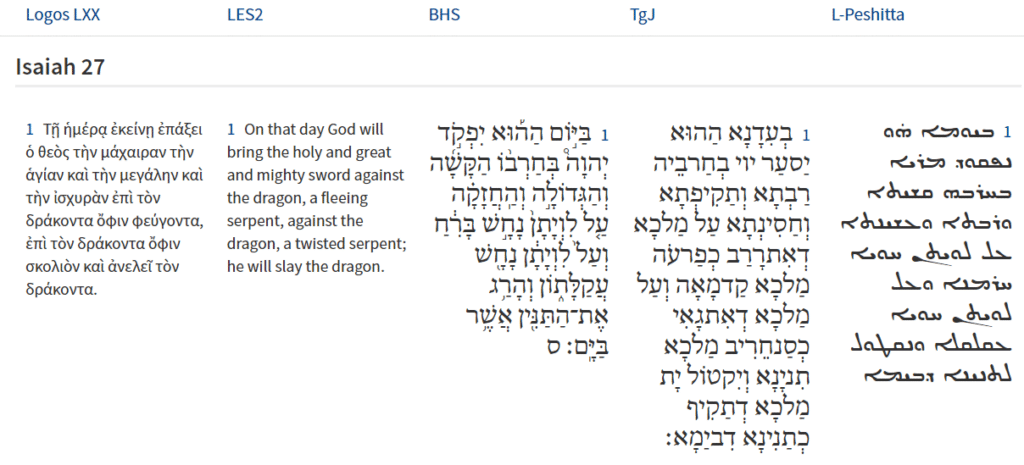
The Targum translation writes “1 At that time the Lord shall punish with his great, mighty, and strong sword the king, who has magnified himself as Pharaoh the first, and the king who has exalted himself as Sennacherib the second; and he shall slay the king that is strong as the dragon that is in the sea.” Here the TgJ translates the kings of Egypt and Babylon with the dragon of the sea. This may have led to some of the commentators arguing about to whom the serpent is referring to Assyria, Babylonia, or Egypt, etc. The Septuagint writes 1 Τῇ ἡμέρᾳ ἐκείνῃ ἐπάξει ὁ θεὸς τὴν μάχαιραν τὴν ἁγίαν καὶ τὴν μεγάλην καὶ τὴν ἰσχυρὰν ἐπὶ τὸν δράκοντα ὄφιν φεύγοντα, ἐπὶ τὸν δράκοντα ὄφιν σκολιὸν καὶ ἀνελεῖ τὸν δράκοντα.† 1 On that day God will bring the holy and great and mighty sword against the dragon, a fleeing serpent, against the dragon, a twisted serpent; he will slay the dragon. (LES) Here the Greek translates תַּנִּין as δράκοντα (dragon). Here the δράκοντα (dragon) is related to the ὄφιν (serpent). In the Homeric writings this is often the case, and the serpent often evokes fear from the sense of the creature being monstrous in size and power. In the Septuagint, the δράκων occurs c. 35×. It is first found with the meaning “snake” (Shemot / Exodus 7:9-12 [3×] and Devarim / Deuteronomy 32:33) as the rendering of תַּנִּין. This Hebrew word is always translated using δράκων when it has this sense (see Job 7:12, Tehillim / Psalms 74:13, Ezekiel 29:3). In addition, δράκων was chosen to render various other Hebrew terms, לִוְיָתָן “Leviathan” (see Job 41:1 [40:25]; Tehillim / Psalms 74:14 [73:14], Isaiah 27:1). As we had seen in the introduction, the ancient Near East myths describe the dragon or serpent as a picture of the primeval power of chaos. This serpent is defeated at the hands of a god which then facilitated the world coming into being. It may be possible that the authors of the Tanakh used this imagery to ascribe all power and authority of our God, the Lord God Almighty, the God of Israel, having power over evil. (Job 26:12-13, Tehillim / Psalms 74:13-14 [73:13–14], Isaiah 51:9). We are told according to the biblical text that Monsters or dragons live in the sea (see Job 7:12, Tehillim / Psalms 148:7, Amos 9:3), but the time will come when God will destroy them (Isaiah 27:1). In addition to this, we also find Scriptural support for the TgJ translation of Isaiah 27:1 when Ezekiel describes Pharaoh as a dragon, as an enemy of God’s people (see Ezekiel 29:3, 32:2). Now in the NT text, the word δράκων occurs 13×, and only in the book of Revelation, where it is used exclusively with reference to Satan (8× in Revelation 12:3-17, 13:2, 13:4, 13:11, 16:13, 20:2). This identification is made explicit in 12:9 and 20:2, where the word is used along with the phrase ὁ ὄφις ὁ ἀρχαῖος, “the ancient serpent” which provides a direct connection back to the Bereshit / Genesis 3 account. The terms διάβολος “devil,” and Σατανᾶς (see Σατάν is a transliteration of the Hebrew HaSatan, the deceiver). (Statistical information taken from Christopher A. Beetham, ed., “Δράκων,” Concise New International Dictionary of New Testament Theology and Exegesis, Grand Rapids, MI: Zondervan Academic, 2021, 245) We note that ultimately these things describe the sovereignty of God over the nations and even over the spiritual realm, and that He is victorious, and in Him is redemption and truth! We note what these things describe are that the Lord is powerful, and for those who rebel against His word and His ways, there only remains His divine wrath for such people. We also note there are some eschatological aspects to Isaiah 27:1, if we parallel this to the descriptions provided in the book of revelation. Isaiah here in opening this chapter, is expressing a divine truth, that the Lord has great love and concern for His people, those who have faith and remain faithful to Him. The wrath of God is to those who reject the Lord and His Messiah Yeshua! We note there are many statements in the NT text that speak to this very thing! The God of the Tanakh is the same as the God in the NT text! What the Lord God was looking for in the Tanakh, and in the NT text is repentance, humility, faith, and faithfulness! These things speak to those who remain faithful will have a part in the garden of God, also known as paradise, according to the various descriptions we read in the NT text.
Isaiah continues saying the following according to Isaiah 27:2-3.
ספר ישעיה פרק כז
ב בַּיּוֹם הַהוּא כֶּרֶם חֶמֶד עַנּוּ-לָהּ: ג אֲנִי יְהֹוָה נֹצְרָהּ לִרְגָעִים אַשְׁקֶנָּה פֶּן יִפְקֹד עָלֶיהָ לַיְלָה וָיוֹם אֶצֳּרֶנָּה:
Isaiah 27:2 states, “In that day sing ye unto her, A vineyard of red wine. (בַּיּוֹם הַהוּא כֶּרֶם חֶמֶד עַנּוּ-לָהּ)” Isaiah 27:3 “I the LORD do keep it; I will water it every moment: Lest any hurt it, I will keep it night and day. (אֲנִי יְהֹוָה נֹצְרָהּ לִרְגָעִים אַשְׁקֶנָּה פֶּן יִפְקֹד עָלֶיהָ לַיְלָה וָיוֹם אֶצֳּרֶנָּה)” Here Isaiah speaks to singing to the vineyard of red wine. The vineyard is a plot of land that is used for growing grapes. Israel’s terrain was ideal for vineyards, which may account for their appearance throughout Scripture in narrative, poetic, and prophetic literature. Vineyards were important to the authors of Scripture and are the setting for many biblical narratives. The Torah includes several regulations related to vineyards (see Shemot / Exodus 22:5, 23:11, Vayikra / Leviticus 19:10, 25:3-4, and Devarim / Deuteronomy 22:9 and 23:24). They were part of Israel’s inheritance (Devarim / Deuteronomy 6:11, Joshua 24:13, Nehemiah 9:25, compare Bamidbar / Numbers 16:14). Vineyards were also a post-exilic sign of restoration (see Jeremiah 31:5, 32:15, Ezekiel 28:26, Hosea 2:15, Amos 9:14). Vineyards were seen as wise investments (Mishley / Proverbs 31:16) which provided sustenance to the owner (Nehemiah 5:1-5, 5:11). God sometimes threatened to curse vineyards (see Devarim / Deut 28:30, 28:39). Israel’s rulers might demand taxation from the produce or even confiscate the vineyards (see 1 Samuel 8:14-15, 22:7, 1 Kings 21:1-18). In the Tanakh, vineyards provide imagery for poetry (see Job 24:6, 24:18, Tehillim / Psalms 107:37, Song 1:14, 2:15, 7:12), the wisdom literature (Mishley / Proverbs 24:30, 31:16), in parables (Isaiah 5:1-7), divine pronouncements (Jeremiah 12:10), laments (Ezekiel 19:10), analogies (Isaiah 1:8), depictions of deliverance (Isaiah 27:2, 65:21), and messages of judgment (Jeremiah 35:7-9; Amos 4:9, 5:11, 5:17, Zephaniah 1:13). Yeshua also continued this tradition, using vineyards in many of his parables (see Matthew 20:1-8, 21:28-41, Mark 12:1-9, Luke 13:6-7, 20:9-16). We note how the text literally states בַּיֹּ֖ום הַה֑וּא כֶּ֥רֶם חֶ֖מֶד עַנּוּ־לָֽהּ “in that day sing to the beautiful vineyard.” Not certain where the KJV gets “red wine?” Also, in Isaiah 27:3 we are told that the Lord Himself will keep the vineyard, water it, and keep it day and night. We note that there is something very special about this vineyard, that the Lord God pays particular attention to. It is interesting how the LXX translates this verse quite differently.
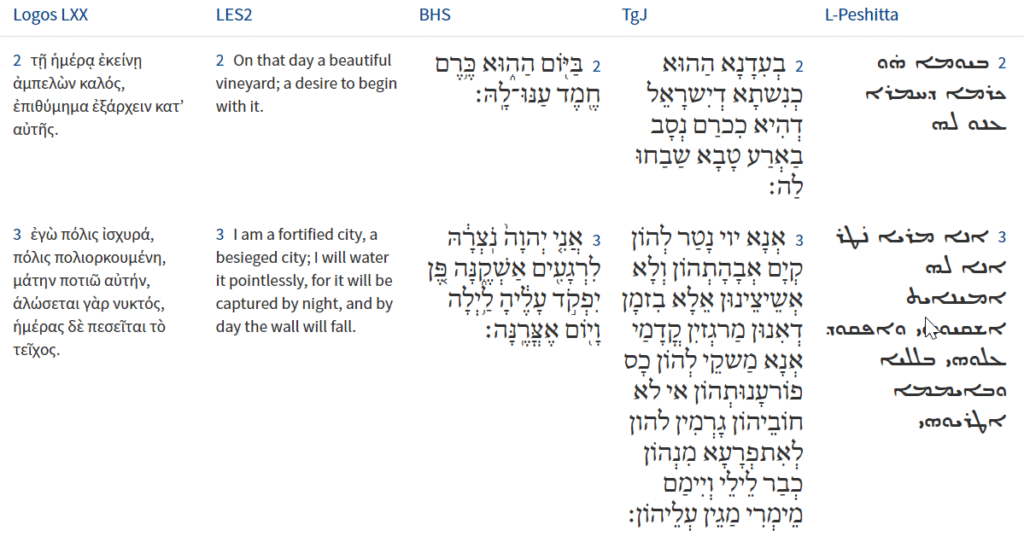
The Targum Translation states, “2 At that time the congregation of Israel, which is like a vineyard planted in a goodly land, shall sing concerning that vineyard: 3 I, the Lord, keep the covenant of their fathers with them, that I may not destroy them; but at the time that they provoked me to anger, I gave them the cup of their punishment to drink; but their sins were the cause of their punishment; nevertheless, my WORD shall protect them by day and by night.” (TgJ) We note how the TgJ adds a few things to draw out important points concerning sin and punishment. In addition, we are told that the Word of God protects, and how the Word protects is found in its application to our lives! The LXX translates saying, 2 τῇ ἡμέρᾳ ἐκείνῃ ἀμπελὼν καλός, ἐπιθύμημα ἐξάρχειν κατʼ αὐτῆς.† 3 ἐγὼ πόλις ἰσχυρά, πόλις πολιορκουμένη, μάτην ποτιῶ αὐτήν, ἁλώσεται γὰρ νυκτός, ἡμέρας δὲ πεσεῖται τὸ τεῖχος.† “2 On that day a beautiful vineyard; a desire to begin with it. 3 I am a fortified city, a besieged city; I will water it pointlessly, for it will be captured by night, and by day the wall will fall.” (LES) We note that in both the LXX and TgJ there is no mention of “red wine” per the KJV translation. Here the LXX writes about the futility of care for the vineyard, since it will be captured because of the unfaithfulness of the people. From a Torah perspective, according to Bereshit / Genesis 9:20–21, Noah was “a man of the soil” who planted a vineyard, then he drank some of its wine, he became drunk and lay uncovered inside his tent. The Torah describes the twin themes of the vine and wine as symbols of fertility and well-being on the one hand and of wine as a cause of debauchery and shame on the other hand. This theme runs throughout Scripture. The vine was an important part of Israel’s daily life as well as that of the Tabernacle. Even Yeshua and the disciples used the vine analogy for abiding in the Lord or having a part with the Messiah! As with other crops, the owner was not permitted to reap the vineyard twice in one harvest; gleanings were to be left for those who lacked possessions (see Vayikra / Leviticus 19:10, Devarim / Deuteronomy 24:21). Vineyards were to lie fallow every seventh year during the shemitah (see Shemot / Exodus 23:10-11, Vayikra / Leviticus 25:3-7) and they were not to be sown with other plants (see Devarim / Deuteronomy 22:9). In Isaiah 5:1-7 we find a picture of Israel as a vineyard, God as the vinedresser, and a harvest of wild grapes instead of ripe, juicy grapes from which to make wine. The symbolism of this passage is found also in other prophetic books and in Psalms. Israel is a vine brought out of Egypt that fills the land; the psalmist asks why God has allowed it to be ravaged (Tehillim / Psalms 80:8–13 [LXX 79:8–13]). Although Israel was a “choice vine,” we are told that it became a “wild vine.” (Jeremiah 2:21) due to her sins. We note something about keeping grapes. In order to have a plentiful harvest, the owner must prune and trim the plant back to maximize growth of the fruit. The analogy is to that of God our Father being the vine dresser, the owner, and so His hand is always at work in our lives to cause us to have a greater fruit production for His glory. Here again we see this idea of the Lord working in our lives, this is something each and every one of us should be observing in our lives. If you do not see or know that God is working in your life, this is a daily thing, then isn’t it time for a reexamination of faith and purpose?
We note that the Hebrew text writes חֶמֶד (pleasant) and not חֶמֶר (wine) and so it is possible that the translators of the KJV mistook the letter dalet for the letter resh? We note that the DSS 1QIsa supports the KJV translation writing חֶמֶר. Regardless on how this verse is translated, or whether there is a scribal error or not, this song indicates how God’s people, the redeemed sing of God’s triumph over the corrupt world (Isaiah 24:9, 25:5, 26:1, 26:19) and we also note that HaShem also sings of his beloved too.

We note that the emphasis upon the vine throughout the scriptures emphasize how God’s people, their keeper, is the Lord God our Father in heaven Himself! Yeshua used this truth when he taught according to John 10:11-13. We are told that the Lord God does not abandon His people to their enemies but is their watchman both day and night. (Tehillim / Psalms 121:4-5, Isaiah 5:2, Matthew 21:33)
Isaiah continues according to Isaiah 27:4 to say the following:
ספר ישעיה פרק כז
ד חֵמָה אֵין לִי מִי-יִתְּנֵנִי שָׁמִיר שַׁיִת בַּמִּלְחָמָה אֶפְשֳֹעָה בָהּ אֲצִיתֶנָּה יָּחַד:
Isaiah 27:4 states, “Fury is not in me: Who would set the briers and thorns against me in battle? I would go through them, I would burn them together. (חֵמָה אֵין לִי מִי-יִתְּנֵנִי שָׁמִיר שַׁיִת בַּמִּלְחָמָה אֶפְשֳֹעָה בָהּ אֲצִיתֶנָּה יָּחַד)” This verse begins saying חֵמָה אֵין לִי “I do not have anger” which expresses the character of God, that what He does is not based upon an emotional moment. The remainder of the verse speaks to the actions that are taken when briars and thorns (שָׁמִיר שַׁיִת) are found in battle, and how the Lord deals with these, to burn them up. The key concept here is not being a briar or a thorn. Note the Hebrew text writes שָׁמִיר שַׁיִת “briars and weeds.” The thorn described here is in a general sense which designates several species. This has its parallel to a man, woman, or child of rebellious nature, is a thorn or a weed in the midst of God’s people. We note what Yeshua said when he alluded to the low-quality fruit of the thorn when he asks, “Are grapes gathered from thorns, or figs from thistles?” (see Matthew 7:16 and Luke 6:44) We also note the Torah perspective according to Bereshit / Genesis 3:17-18 where God curses the ground, declaring that it would bear thorns and thistles. It is because of this that farmers constantly battle thorns and weeds which grow readily on untended land (see Mishley / Proverbs 15:19). Yeshua uses this imagery in the parable of the Sower (see Mark 4:1-9, etc.). The prophets use thorns and briers as symbols of the desolation of the land and the people (see Isaiah 5:6 and Jeremiah 12:13). Thorns were used as hedges (Sir. 28:24) and instruments of torture (Judges 8:16). They are highly flammable (Shemot / Exodus 22:6 [MSS 5]), were cleared by burning (Isaiah 33:12) and were used in hearth fires (see Tehillim / Psalms 58:9, Ecclesiastes 7:6). (Megan Bishop Moore, “Thorn,” ed. David Noel Freedman, Allen C. Myers, and Astrid B. Beck, Eerdmans Dictionary of the Bible (Grand Rapids, MI: W.B. Eerdmans, 2000), 1304.)
Isaiah continues saying the following according to Isaiah 27:5-6.
ספר ישעיה פרק כז
ה אוֹ יַחֲזֵק בְּמָעוּזִּי יַעֲשֶֹה שָׁלוֹם לִי שָׁלוֹם יַעֲשֶֹה-לִּי: ו הַבָּאִים יַשְׁרֵשׁ יַעֲקֹב יָצִיץ וּפָרַח יִשְֹרָאֵל וּמָלְאוּ פְנֵי-תֵבֵל תְּנוּבָה:
Isaiah 27:5 states, “Or let him take hold of my strength, That he may make peace with me; And he shall make peace with me. (אוֹ יַחֲזֵק בְּמָעוּזִּי יַעֲשֶֹה שָׁלוֹם לִי שָׁלוֹם יַעֲשֶֹה-לִּי)” Isaiah 27:6 “He shall cause them that come of Jacob to take root: Israel shall blossom and bud, And fill the face of the world with fruit. (הַבָּאִים יַשְׁרֵשׁ יַעֲקֹב יָצִיץ וּפָרַח יִשְֹרָאֵל וּמָלְאוּ פְנֵי-תֵבֵל תְּנוּבָה)” We see again this idea of taking hold of the strength of God (אוֹ יַחֲזֵק בְּמָעוּזִּי) which literally says “oh would take hold of my mountain stronghold.” יַעֲשֶֹה שָׁלוֹם לִי שָׁלוֹם יַעֲשֶֹה-לִּי “and he will make peace for me, and he will make peace for me.” We note how the imperfect tenses that are repeated here יַעֲשֶֹה is in reference to something that is going to be accomplished but has not yet occurred (peace) and how one’s actions or taking hold of the stronghold of God, only when this happens is this accomplished! This speaks to our taking refuge in the Lord and of the Lord being the one who protects us and is the one in whom we can trust! We note how this speaks to the character of God, that He is merciful, caring, loving, and how he is not committed to the relentless destruction of His enemies, but would rather be reconciled to his enemies so that they would be enemies no more. Notice how Paul uses this concept according to Colossians 1:21.
Colossians 1:18–23
1:18 And he is the head of the body, the church: who is the beginning, the firstborn from the dead; that in all things he might have the preeminence. 1:19 For it pleased the Father that in him should all fulness dwell; 1:20 And, having made peace through the blood of his cross, by him to reconcile all things unto himself; by him, I say, whether they be things in earth, or things in heaven. 1:21 And you, that were sometime alienated and enemies in your mind by wicked works, yet now hath he reconciled 1:22 In the body of his flesh through death, to present you holy and unblameable and unreproveable in his sight: 1:23 If ye continue in the faith grounded and settled, and be not moved away from the hope of the gospel, which ye have heard, and which was preached to every creature which is under heaven; whereof I Paul am made a minister; (KJV, ܘܗܽܘܝܽܘ ܪܻܫܳܐ ܕ݁ܦ݂ܰܓ݂ܪܴܐ ܕ݁ܥܺܕ̱݁ܬܴ݁ܐ ܇ ܕܻ݁ܐܝܬ݂ܱܘܗ̄ܝ ܪܻܫܳܐ ܘܒ݂ܽܘܟ݂ܪܴܐ ܕ݁ܡܶܢ ܒܷ݁ܝܬ݂ ܡܺܝ̈ܬ݂ܷܐ ܁ ܕ݁ܢܶܗܘܶܐ ܩܰܕ݂ܡܳܝ ܒ݁ܟ݂ܽܠ ܇ܕ݁ܒ݂ܶܗ ܗܽܘ ܨܒ݂ܳܐ ܟܾ݁ܠܷܗ ܡܽܘܠܴܝܳܐ ܠܡܶܥܡܰܪ ܁ ܘܒ݂ܺܐܝܕ݂ܶܗ ܠܱܡܪܱܥܳܝܽܘ ܠܷܗ ܟܾ݁ܠܡܶܕܷ݁ܡ ܂ ܘܫܰܝܶܢ ܒܱ݁ܕ݂ܡܳܐ ܕܱ݁ܙܩܺܝܦ݂ܶܗ ܒܻ݁ܐܝ̈ܕ݂ܰܘܗ̄ܝ ܁ ܐܷܢ ܕ݁ܒ݂ܰܐܪܥܳܐ ܂ ܘܶܐܢ ܕ݁ܒ݂ܰܫܡܰܝܳܐ ܂ ܐܴܦ݂ ܠܟ݂ܽܘܢ ܕ݁ܡܶܢ ܩܕ݂ܺܝܡ ܢܽܘܟ݂ܪܴ̈ܝܶܐ ܗ̄ܘܰܝܬܾ݁ܘܢ ܂ ܘܰܒ݂ܥܶܠܕ݁ܒ݂ܴ̈ܒ݂ܶܐ ܒ݁ܪܷ̈ܥܝܳܢܰܝܟܾ݁ܘܢ ܁ ܡܶܛܾܠ ܥܒ݂ܳܕ݂ܰܝ̈ܟܾ݁ܘܢ ܒܻ݁ܝ̈ܫܶܐ ܆ ܫܰܝܶܢܟ݂ܽܘܢ ܗܳܫܳܐ ܒ݁ܦ݂ܰܓ݂ܪܴܐ ܕ݁ܒ݂ܶܣܪܷܗ ܘܰܒ݂ܡܰܘܬܷ݁ܗ ܇ ܕܱ݁ܢܩܺܝܡܟ݂ܽܘܢ ܩܕ݂ܳܡܰܘܗ̄ܝ ܩܰܕܻ݁ܝܫܺܝܢ ܕ݁ܠܴܐ ܡܽܘܡ ܘܰܕ݂ܠܴܐ ܪܷܫܝܳܢ ܆ ܐܷܢ ܬ݁ܩܰܘܽܘܢ ܒ݁ܗܰܝܡܳܢܽܘܬ݂ܟ݂ܽܘܢ ܟܱ݁ܕ݂ ܫܰܪܻܝܪܴܐ ܫܶܬ݂ܷܐܣܬ݂ܟ݂ܽܘܢ ܇ ܘܠܴܐ ܡܶܬ݁ܬ݁ܙܺܝܥܺܝܬܾ݁ܘܢ ܡܶܢ ܣܰܒ݂ܪܴܐ ܕܷ݁ܐܘܰܢܓܷ݁ܠܻܝܳܘܢ ܇ ܗܰܘ ܕܱ݁ܫܡܰܥܬܾ݁ܘܢ ܕܷ݁ܐܬ݂ܟ݁ܪܷܙ ܒ݁ܟ݂ܽܠܴܗ ܒ݁ܪܻܝܬ݂ܴܐ ܕܱ݁ܬ݂ܚܶܝܬ݂ ܫܡܰܝܳܐ ܂ ܗܰܘ ܕܷ݁ܐܢܳܐ ܦܱ݁ܘܠܴܘܣ ܗܘܺܝܬ݂ ܡܫܰܡܫܳܢܶܗ ܂ 18 καὶ αὐτός ἐστιν ἡ κεφαλὴ τοῦ σώματος τῆς ἐκκλησίας·* ὅς ἐστιν ⸆ ἀρχή,* πρωτότοκος °ἐκ τῶν νεκρῶν,* ἵνα γένηται ἐν πᾶσιν αὐτὸς πρωτεύων, 19 ὅτι ἐν αὐτῷ εὐδόκησεν πᾶν τὸ πλήρωμα κατοικῆσαι* 20 καὶ διʼ αὐτοῦ ἀποκαταλλάξαι τὰ πάντα εἰς αὐτόν,* εἰρηνοποιήσας διὰ τοῦ αἵματος τοῦ σταυροῦ αὐτοῦ,* ⸋[διʼ αὐτοῦ]⸌ εἴτε τὰ ἐπὶ τῆς γῆς εἴτε τὰ ἐν τοῖς οὐρανοῖς.* 21 Καὶ ὑμᾶς ποτε ὄντας ἀπηλλοτριωμένους καὶ ἐχθροὺς τῇ διανοίᾳ ἐν τοῖς ἔργοις τοῖς πονηροῖς,* 22 νυνὶ δὲ ⸀ἀποκατήλλαξεν ἐν τῷ σώματι τῆς σαρκὸς αὐτοῦ διὰ τοῦ θανάτου ⸆ παραστῆσαι ὑμᾶς ἁγίους καὶ ἀμώμους καὶ ἀνεγκλήτους κατενώπιον αὐτοῦ,* 23 εἴ γε ἐπιμένετε τῇ πίστει τεθεμελιωμένοι καὶ ἑδραῖοι °καὶ μὴ μετακινούμενοι ἀπὸ τῆς ἐλπίδος τοῦ εὐαγγελίου οὗ ἠκούσατε,* τοῦ κηρυχθέντος ἐν πάσῃ ⸆ κτίσει τῇ ὑπὸ τὸν οὐρανόν,* οὗ ἐγενόμην ἐγὼ Παῦλος ⸀διάκονος.)
Paul writes that we were alienated and enemies, and it was because of the Messiah Yeshua and His blood that reconciled us with God. The Lord God gives His Holy Spirit to dwell within those who believe in Yeshua and transforms our lives. So as Isaiah is saying here, אוֹ יַחֲזֵק בְּמָעוּזִּי “oh would take hold of my mountain stronghold,” this is what takes place for those who believe in Yeshua. These things show the completing of this idea, of the Lord God not being committed to destruction, but to love, mercy, peace, redemption, and restoration! In fact, Isaiah speaks to God providing the refuge for His people. According to the NT text, He did exactly that in Yeshua the Messiah!
In Isaiah 27:6 הַבָּאִים יַשְׁרֵשׁ יַעֲקֹב יָצִיץ וּפָרַח יִשְֹרָאֵל וּמָלְאוּ פְנֵי-תֵבֵל תְּנוּבָה “He shall cause them that come of Jacob to take root: Israel shall blossom and bud, And fill the face of the world with fruit” it is very interesting how the word for fruit תְּנוּבָה is not your standard word which is פְּרִי. When we look at the text comparison of the LXX, MSS, TgJ and L-Peshitta we see the following:
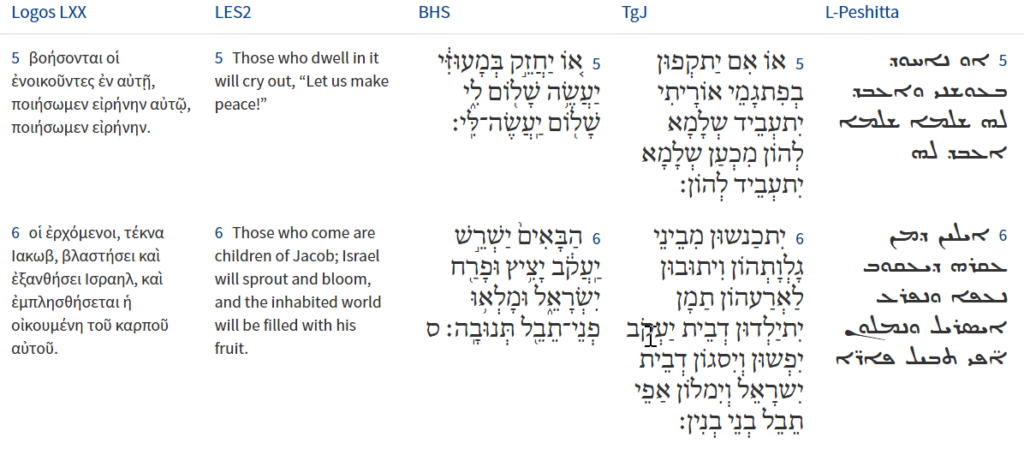
The LXX writes saying, 5 βοήσονται οἱ ἐνοικοῦντες ἐν αὐτῇ, ποιήσωμεν εἰρήνην αὐτῷ, ποιήσωμεν εἰρήνην.† 6 οἱ ἐρχόμενοι, τέκνα Ιακωβ, βλαστήσει καὶ ἐξανθήσει Ισραηλ, καὶ ἐμπλησθήσεται ἡ οἰκουμένη τοῦ καρποῦ αὐτοῦ.† “5 Those who dwell in it will cry out, “Let us make peace!” 6 Those who come are children of Jacob; Israel will sprout and bloom, and the inhabited world will be filled with his fruit.” Here the word for fruit is καρποῦ. This word καρπός occurs c. 125× in the LXX and usually for Heb. פְּרִי which refers to the fruit produced by trees (see Vayikra / Leviticus 26:4) or by the vine (see Hosea 10:1) but is not applied to grain or crops generally. The word is commonly used for offspring, such as in the phrase “fruit of the womb” (see Bereshit / Genesis 30:2, Micah 6:7, etc.). It can be used figuratively in the sense “result” (see Mishley / Proverbs 1:31, Amos 6:12 etc.). Philo uses καρπός about 270×. Though usually the sense is literal, we find a variety of figurative applications: just as plants, when irrigated, bear fruit, so does the soul when watered with wisdom (Post. 125); when virtues are implanted in the mind, they “bring forth most advantageous fruit, good and praiseworthy deeds” (Agr. 9). In the NT text the noun καρπός occurs more than 2×. The adjective ἄκαρπος, “unfruitful,” is found 1×. The verb καρποφορέω, “to bear fruit,” occurs 1×, and its cognate adjective καρποφόρος, “fruit bearing,” only once (Acts 14:17). It should be noted that to express the idea of bearing fruit, John prefers the expression καρπὸν φέρειν (see John 12:24, 15:2, 15:4-5, 15:8, 15:16), and the Synoptics often use καρπὸν ποιεῖν (see Matthew 3:8, etc.). (Christopher A. Beetham, ed., “Καρπός,” Concise New International Dictionary of New Testament Theology and Exegesis, Grand Rapids, MI: Zondervan Academic, 2021, 439.) The interesting aspect about all of this is to the fruit that one bears due to having joined themselves with God in heaven, and how Israel centric these descriptions are. God is the keeper of His people in the last days, he will supply our needs and turn our enemies away from us. From both Isaiah’s perspective, and the NT perspective, the τέκνα Ιακωβ “children of Jacob” includes both Jew and Gentile alike, those who walk according to their faith and remain faithful to the Lord. (Romans 11:22-27, Philippians 2:9-11) All of these things provide a significant context to the NT text, and the events that we read have taken place in the NT text in regard to Yeshua the Messiah! This is all the more reason why we should take our faith very seriously, and believe who Yeshua is, and what he has done on our behalf!
Rabbinic Literature
The Targum Jonathan is an Aramaic and Rabbinic interpretation of the book of Isaiah and therefore is a very valuable resource for our study of the book of Isaiah!
תרגום יונתן בן עוזיאל אל ישעיה פרק כז:א-ז
א בְעִדָנָא הַהוּא יַסעַר יוי בְחַרבֵיה רַבְתָא וְתַקִיפְתָא וְחַסִינְתָא עַל מַלכָא דְאִתרָרַב כְפַרעֹה מַלכָא קַדמָאָה וְעַל מַלכָא דְאִתגָאִי כְסַנחֵרִיב מַלכָא תִניָנָא וְיִקטֹול יָת מַלכָא דְתַקִיף כְתַנִינָא דִביַמָא׃ ב בְעִדָנָא הַהוּא כְנִשתָא דְיִשרָאֵל דְהִיא כִכרַם נְסָב בַאְרַע טָבָא שַבַחוּ לַה׃ ג אְנָא יוי נָטַר לְהֹון קְיָם אְבָהָתְהֹון וְלָא אְשֵיצֵינוּן אֵלָא בִזמָן דְאִנוּן מַרגְזיִן קֳדָמַי אְנָא מַשקֵי לְהֹון כָס פֹורעָנוּתְהֹון אי לא חֹובֵיהֹון גָרְמִין להון לְאִתפְרָעָא מִנְהֹון כְבַר לֵילֵי וְיִימַם מֵימְרִי מַגֵין עְלֵיהֹון׃ ד הָא גְבוּרָן סַגִי קֳדָמַי הְלָא אִם יְשַווֹן בֵית יִשרָאֵל אַפֵיהֹון לְמַעְבַד אֹורָיתָא אְשַלַח רוּגזִי וְחִמתִי בְעַמְמַיָא דְמִתגָרַן בְהֹון וַאְשֵיצֵינוּן כְמָא דִמשֵיצְיָא אִשָתָא הוּבאֵי וּבוּר כַחדָא׃ ה אֹו אִם יַתקְפוּן בְפִתגָמֵי אֹורָיתִי יִתעְבֵיד שְלָמָא לְהֹון מִכְעַן שְלָמָא יִתעְבֵיד לְהֹון׃ ו יִתכַנשוּן מִבֵינֵי גָלְוָתְהֹון וִיתוּבוּן לַאְרַעהֹון תַמָן יִתיַלְדוּן דְבֵית יַעְקֹב יִפְשוּן וְיִסגֹון דְבֵית יִשרָאֵל וְיִמלֹון אַפֵי תֵבֵל בְנֵי בְנִין׃
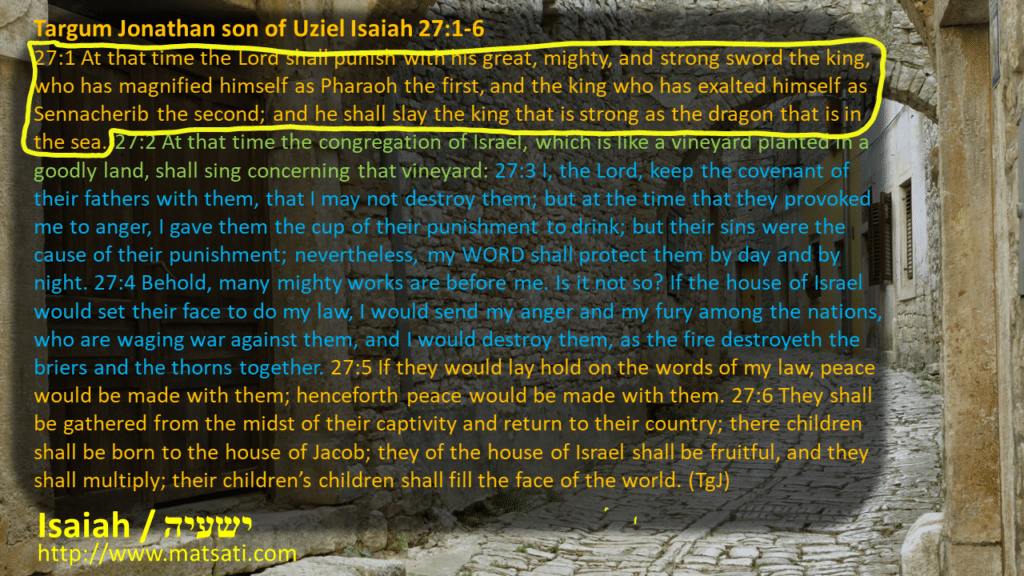
Targum Jonathan son of Uziel Isaiah 27:1-6
27:1 At that time the Lord shall punish with his great, mighty, and strong sword the king, who has magnified himself as Pharaoh the first, and the king who has exalted himself as Sennacherib the second; and he shall slay the king that is strong as the dragon that is in the sea. 27:2 At that time the congregation of Israel, which is like a vineyard planted in a goodly land, shall sing concerning that vineyard: 27:3 I, the Lord, keep the covenant of their fathers with them, that I may not destroy them; but at the time that they provoked me to anger, I gave them the cup of their punishment to drink; but their sins were the cause of their punishment; nevertheless, my WORD shall protect them by day and by night. 27:4 Behold, many mighty works are before me. Is it not so? If the house of Israel would set their face to do my law, I would send my anger and my fury among the nations, who are waging war against them, and I would destroy them, as the fire destroyeth the briers and the thorns together. 27:5 If they would lay hold on the words of my law, peace would be made with them; henceforth peace would be made with them. 27:6 They shall be gathered from the midst of their captivity, and return to their country; there children shall be born to the house of Jacob; they of the house of Israel shall be fruitful, and they shall multiply; their children’s children shall fill the face of the world. (TgJ)
The TgJ writes א בְעִדָנָא הַהוּא יַסעַר יוי בְחַרבֵיה רַבְתָא וְתַקִיפְתָא וְחַסִינְתָא עַל מַלכָא דְאִתרָרַב כְפַרעֹה מַלכָא קַדמָאָה וְעַל מַלכָא דְאִתגָאִי כְסַנחֵרִיב מַלכָא תִניָנָא וְיִקטֹול יָת מַלכָא דְתַקִיף כְתַנִינָא דִביַמָא׃ 27:1 At that time the Lord shall punish with his great, mighty, and strong sword the king, who has magnified himself as Pharaoh the first, and the king who has exalted himself as Sennacherib the second; and he shall slay the king that is strong as the dragon that is in the sea. (TgJ) Here the TgJ interprets Isaiah 27:1 on the Serpent and Leviathan to refer to the kings of the earth. We note something about the MSS, Isaiah’s original rendition which states, א בַּיּוֹם הַהוּא יִפְקֹד יְהֹוָה בְּחַרְבּוֹ הַקָּשָׁה וְהַגְּדוֹלָה וְהַחֲזָקָה עַל לִוְיָתָן נָחָשׁ בָּרִחַ וְעַל לִוְיָתָן נָחָשׁ עֲקַלָּתוֹן וְהָרַג אֶת-הַתַּנִּין אֲשֶׁר בַּיָּם: 27:1 states, “In that day the LORD with his sore and great and strong sword Shall punish leviathan the piercing serpent, Even leviathan that crooked serpent; And he shall slay the dragon that is in the sea. (KJV) This is Isaiah’s way of referencing that ancient serpent which has been paralleled to the deceiver (HaSatan). In ancient literature such as the book of Job, who lived in the timeframe of when Abraham lived, we read as the Sons of God presented themselves before God, so did HaSatan. And so HaSatan tested both God and Job to see whether Job would turn against the Lord God Almighty. The Lord God gave HaSatan the authority to strike everything that Job had, including his body, but was not allowed to take Job’s life. As we read on in Job 1-2, we learn how for example the Sabians attacked and stole all the cattle that he owned, and a natural event took place that blew down the house his children were celebrating in and they all died, and Job broke out in boils which he scrapped with shards of clay pots. The question then is did HaSatan do these things? The Scriptures speak of others actually doing these things. The point of these things happening, and the conversation that took place in heaven, is to show us the underlying spiritual influences that move leaders and people to sin (note ultimately the people choose to sin and remain guilty for their deeds). This appears to be what we see taking place when the rabbis chose to translate the Isaiah text to refer to that ancient Serpent as the leaders (kings) of the nations. These things provide us with a clear connection and link to the ancient biblical text from Bereshit / Genesis 3 when the serpent deceived Eve and then Adam. We also note the ancient Near Eastern myths depicting the battle between Marduk and Tiamat in Enuma Elish and Baal and Yam/Mot in ancient Canaan which speak to this ancient serpent. This characterization of God fighting with this ancient serpent is very similar to what we read of Leviathan in Isaiah 27:1. We note how the TgJ in and of itself is an ancient translation, and this provides us with some rich context to what we read in the NT text concerning HaSatan, the evil one. In the NT text, HaSatan is depicted as ruler over the kingdom of darkness, and as being the enemy / opponent of Yeshua (note Mark 1:13). We are also told that he is the prince of devils and an opposing enemy of God (see Matthew 12:24-27, Luke 11:15-9). All of these ideas are developed from the ancient biblical text. We are told in the NT text that Yeshua’s work and ministry put an end to HaSatan’s reign (Luke 10:18) and the conversion of the gentiles leads them from HaSatan to God (Acts 26:18). The power of death is removed, Yeshua overcomes, and there will be a final day of redemption when death itself will be destroyed! All of these things provide us with a very clear link in the Scriptures to HaSatan, that ancient serpent spoken of in the garden according to Bereshit / Genesis 3 and here in Isaiah 27:1 in the TgJ who the underlying spiritual force at work in the lives of the kings of the nations is. The commentary Derush Chidushei HaLevana 4:1 Part 11 states the following concerning these things.
Derush Chidushei HaLevana 4,1 Part 11
Furthermore, we find several verses that appear to contradict this principle.9Maharal was aware of this question, and offers the following explanation (Chiddushei Aggados, Shevuos 9b): when the created beings are complementary, like heaven and earth, it is possible that they were created at the same time even though they are not identical. For example, “God created the great sea-creatures.” 10Bereishis 1:21. There are some who, like Rashi, interpret the verse simply, as referring to the various large fish in the sea. Now, certainly, not all the large fish are of the same size, as any sea-farer will relate. Even if one would say that – as is the Aggadic interpretation 11Bava Basra 74b. that Rashi also cites – the verse refers to the Leviathan and its mate, the male and female Leviathan were not identical, as is evident from that Talmudic passage which cites the verse, 12Yeshayahu 27:1. “On that day, God will focus the attention of His hard and strong sword upon Leviathan, the extended serpent, and upon Leviathan, the crooked serpent.” The Talmud notes that the word Leviathan is mentioned twice, once referring to the male and once to the female. Rashbam explains that the words “the extended serpent” refer to the male, which is straight, like a door-bolt. 13The Hebrew describes the first Leviathan as nachash bariach, which we translated as, “an extended serpent.” Rashbam interprets the word bariach as meaning “a door-bolt”, for the reason Tosfos Yom Tov gives in the main text. The words “the crooked serpent” refer to the female Leviathan that surrounds the entire world. Thus, even according to this interpretation, the two were not identical: one was male, the other female; one straight, the other crooked. The same principle applies with regard to Adam and Chavah, according to the interpretation 14Berachos 61a. that they were created together as a two-faced entity. According to this interpretation, although Adam and Chavah were created together and fused as one being, they were nevertheless formed differently – one was entirely male, and one was entirely female. The same is true regarding the creation of the heavens. First, it is written: 15Bereishis 1:1. “In the beginning, God created the heavens,” and then it is written: 16Ibid 1:7. “God made the firmament,” as explained by the commentaries. 17The commentaries see an apparent contradiction between these two verses, and many of the commentaries have proposed resolutions. See, for example, the commentaries of Ramban and Radak to Bereishis 1:1. As cited in the previous section, there are at least two heavens, and they are not identical. Since the higher heaven encompasses the lower one, it must be greater than the lower one. In any event, the verses refer to all the heavens, which were created or made with one act.
We note how the commentary writes that Tosfos Yom Tov interprets the Leviathan as that crooked serpent, a reference to the Bereshit / Genesis 3 context, saying that this serpent surrounds the entire world. The context is drawn directly from the Bereshit / Genesis 3 account making reference to Adam and Eve. Note how the rabbinic interpretation also includes the idea of two heavens, where one is greater than the other. These events parallel what we read according to Job with the Benei Elohim sons of God presenting themselves before the Lord, and HaSatan being found among them too. Ibn Ezra also writes the following on Isaiah 27:1 in Part 6 of His commentary.
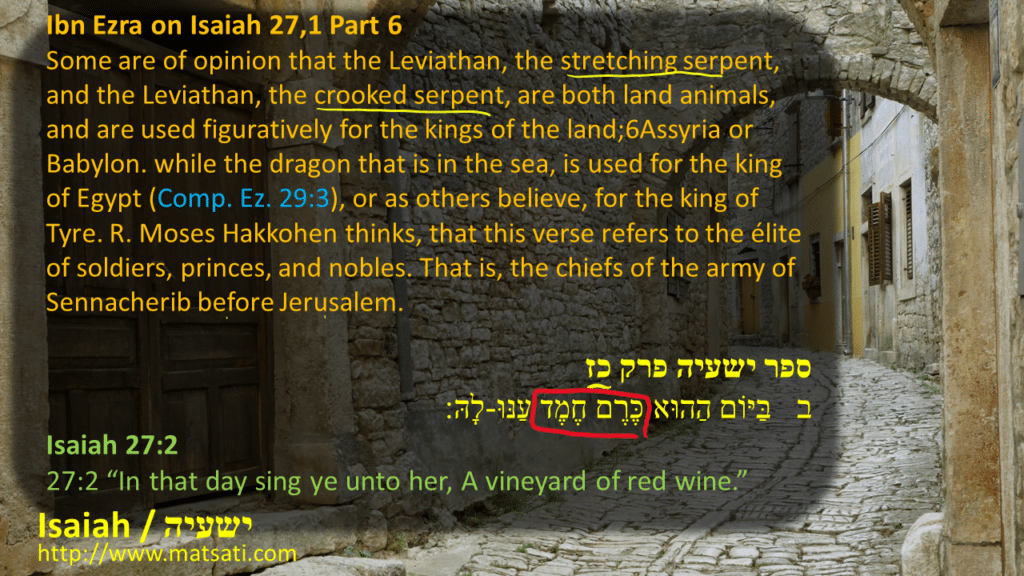
Ibn Ezra on Isaiah 27,1 Part 6
Some are of opinion that the Leviathan, the stretching serpent, and the Leviathan, the crooked serpent, are both land animals, and are used figuratively for the kings of the land;6Assyria or Babylon. while the dragon that is in the sea, is used for the king of Egypt (Comp. Ez. 29:3), or as others believe, for the king of Tyre. R. Moses Hakkohen thinks, that this verse refers to the élite of soldiers, princes, and nobles. That is, the chiefs of the army of Sennacherib before Jerusalem.
Ibn Ezra provides other rabbinic opinions describing how the serpent on land references the kings of Assyria and Babylon, whereas the serpent of the sea represents the kings of Egypt and Tyre. In addition to this, the serpent was associated with immortality and the gods in the Old and Middle Kingdom periods in Egyptian mythology. A snake was depicted on tombs carrying the Pharaoh off into the sky, to the land of the gods. The snake came to be a symbol of kingship around this time and was the reason the serpent appeared on the headdress of the Pharaohs. The two beings’ theory proposed in the rabbinic literature, such as here in Ibn Ezra, cannot be based on Isaiah 27:1, since in the Tanakh Leviathan, tannîn, the writhing serpent and the fleeing serpent are all the same (see Tehillim / Psalms 74:13-14, 89:10-11, Job 7:12, 26:12-13, Isaiah 51:9). Therefore, the duality of this monster / being is actually a unity, one who is ruler over the kingdom of darkness whose main goal is to deceive as many people as possible!
Isaiah continues according to the TgJ to say the following, ב בְעִדָנָא הַהוּא כְנִשתָא דְיִשרָאֵל דְהִיא כִכרַם נְסָב בַאְרַע טָבָא שַבַחוּ לַה׃ 27:2 At that time the congregation of Israel, which is like a vineyard planted in a goodly land, shall sing concerning that vineyard: (TgJ) Here the TgJ interprets Isaiah 27:2 to represent Israel as a vineyard whom God planted into a good land. We note how the KJV translates this verse, and how while reading the Hebrew language, if one is reading very quickly, it is possible to accidentally word-scramble due to the similarity of the letters dalet ד and resh ר.
ספר ישעיה פרק כז
ב בַּיּוֹם הַהוּא כֶּרֶם חֶמֶד עַנּוּ-לָהּ:
Isaiah 27:2
27:2 “In that day sing ye unto her, A vineyard of red wine.”
Here when one reads this text, and mistakenly reads חמר as opposed to חֶמֶד one could interpret this verses to be a vineyard of red wine. Both Rashi and Ibn Ezra point out this phenomenon in their commentaries:
Ibn Ezra on Isaiah 27,2 Part 1
חמר Wine8A. V., Red wine. Pure. A vineyard of red wine. Comp. חָמֶר wine (Deut. 32:14). A vineyard of wine. A vineyard that yields a large quantity of wine.
Rashi on Isaiah 27,2 Part 1
On that day At the time of the redemption, they shall sing to Israel, “This is a wine producing vineyard. It has yielded its good wine.” חֶמֶר vinos in O.F., winish.
The actual spelling of the word in Hebrew חֶמֶד means “desire, delight, beauty” as opposed to “red wine.” This may be a moot point, since a vineyard is by definition a garden for grapes and red wine. The point is for the accuracy of the translation. This is not a major issue, but it does present an interesting point to watch out for while reading the Hebrew bible. The Midrash Tanchuma takes the verse from an eschatological sense saying the following:
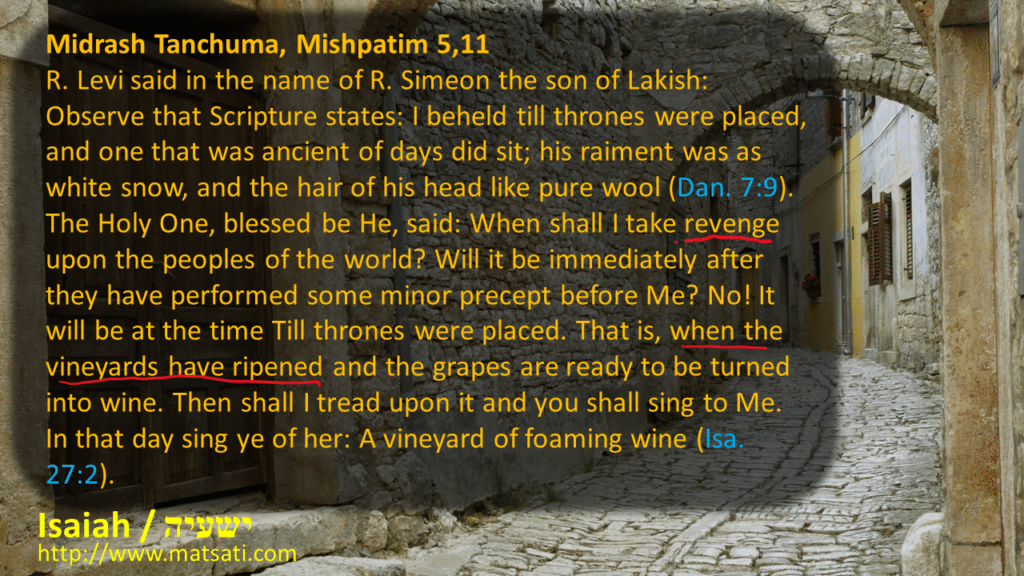
Midrash Tanchuma, Mishpatim 5,11
R. Levi said in the name of R. Simeon the son of Lakish: Observe that Scripture states: I beheld till thrones were placed, and one that was ancient of days did sit; his raiment was as white snow, and the hair of his head like pure wool (Dan. 7:9). The Holy One, blessed be He, said: When shall I take revenge upon the peoples of the world? Will it be immediately after they have performed some minor precept before Me? No! It will be at the time Till thrones were placed. That is, when the vineyards have ripened and the grapes are ready to be turned into wine. Then shall I tread upon it and you shall sing to Me. In that day sing ye of her: A vineyard of foaming wine (Isa. 27:2).
The Midrash takes the perspective of when this song will be sung? The idea is when will the Lord take revenge upon the peoples of the world on behalf of His people? The conclusion is when the vineyards have ripened, so that the grapes are ready for treading. There is an interesting parallel here to the book of Revelation, according to Revelation 14:19-20.
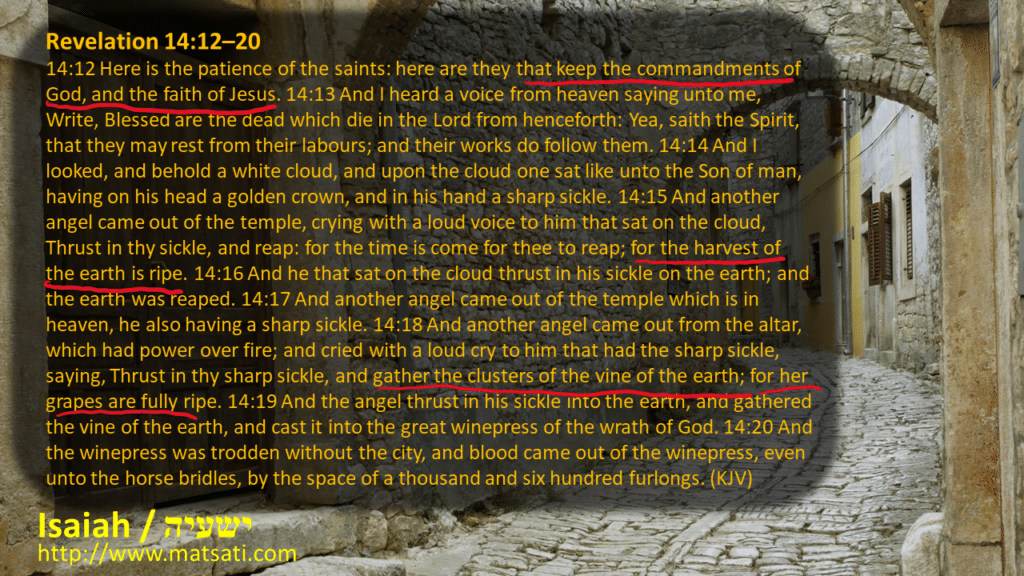
Revelation 14:12–20
14:12 Here is the patience of the saints: here are they that keep the commandments of God, and the faith of Jesus. 14:13 And I heard a voice from heaven saying unto me, Write, Blessed are the dead which die in the Lord from henceforth: Yea, saith the Spirit, that they may rest from their labours; and their works do follow them. 14:14 And I looked, and behold a white cloud, and upon the cloud one sat like unto the Son of man, having on his head a golden crown, and in his hand a sharp sickle. 14:15 And another angel came out of the temple, crying with a loud voice to him that sat on the cloud, Thrust in thy sickle, and reap: for the time is come for thee to reap; for the harvest of the earth is ripe. 14:16 And he that sat on the cloud thrust in his sickle on the earth; and the earth was reaped. 14:17 And another angel came out of the temple which is in heaven, he also having a sharp sickle. 14:18 And another angel came out from the altar, which had power over fire; and cried with a loud cry to him that had the sharp sickle, saying, Thrust in thy sharp sickle, and gather the clusters of the vine of the earth; for her grapes are fully ripe. 14:19 And the angel thrust in his sickle into the earth, and gathered the vine of the earth, and cast it into the great winepress of the wrath of God. 14:20 And the winepress was trodden without the city, and blood came out of the winepress, even unto the horse bridles, by the space of a thousand and six hundred furlongs. (KJV, καὶ ὁ καπνὸς τοῦ βασανισμοῦ αὐτῶν εἰς αἰῶνας αἰώνων ἀναβαίνει καὶ οὐκ ἔχουσιν ἀνάπαυσιν ἡμέρας καὶ νυκτὸς οἱ προσκυνοῦντες τὸ θηρίον καὶ τὴν εἰκόνα αὐτοῦ καὶ εἴ τις λαμβάνει τὸ χάραγμα τοῦ ὀνόματος αὐτοῦ. Ὧδε ἡ ὑπομονὴ τῶν ἁγίων ἐστίν, οἱ τηροῦντες τὰς ἐντολὰς τοῦ θεοῦ καὶ τὴν πίστιν Ἰησοῦ. Καὶ ἤκουσα φωνῆς ἐκ τοῦ οὐρανοῦ λεγούσης· γράψον· μακάριοι οἱ νεκροὶ οἱ ἐν κυρίῳ ἀποθνῄσκοντες ἀπʼ ἄρτι. ναί, λέγει τὸ πνεῦμα, ἵνα ἀναπαήσονται ἐκ τῶν κόπων αὐτῶν, τὰ γὰρ ἔργα αὐτῶν ἀκολουθεῖ μετʼ αὐτῶν. Καὶ εἶδον, καὶ ἰδοὺ νεφέλη λευκή, καὶ ἐπὶ τὴν νεφέλην καθήμενον ὅμοιον υἱὸν ἀνθρώπου, ἔχων ἐπὶ τῆς κεφαλῆς αὐτοῦ στέφανον χρυσοῦν καὶ ἐν τῇ χειρὶ αὐτοῦ δρέπανον ὀξύ. καὶ ἄλλος ἄγγελος ἐξῆλθεν ἐκ τοῦ ναοῦ κράζων ἐν φωνῇ μεγάλῃ τῷ καθημένῳ ἐπὶ τῆς νεφέλης· πέμψον τὸ δρέπανόν σου καὶ θέρισον, ὅτι ἦλθεν ἡ ὥρα θερίσαι, ὅτι ἐξηράνθη ὁ θερισμὸς τῆς γῆς. καὶ ἔβαλεν ὁ καθήμενος ἐπὶ τῆς νεφέλης τὸ δρέπανον αὐτοῦ ἐπὶ τὴν γῆν καὶ ἐθερίσθη ἡ γῆ. Καὶ ἄλλος ἄγγελος ἐξῆλθεν ἐκ τοῦ ναοῦ τοῦ ἐν τῷ οὐρανῷ ἔχων καὶ αὐτὸς δρέπανον ὀξύ. καὶ ἄλλος ἄγγελος [ἐξῆλθεν] ἐκ τοῦ θυσιαστηρίου [ὁ] ἔχων ἐξουσίαν ἐπὶ τοῦ πυρός, καὶ ἐφώνησεν φωνῇ μεγάλῃ τῷ ἔχοντι τὸ δρέπανον τὸ ὀξὺ λέγων· πέμψον σου τὸ δρέπανον τὸ ὀξὺ καὶ τρύγησον τοὺς βότρυας τῆς ἀμπέλου τῆς γῆς, ὅτι ἤκμασαν αἱ σταφυλαὶ αὐτῆς. καὶ ἔβαλεν ὁ ἄγγελος τὸ δρέπανον αὐτοῦ εἰς τὴν γῆν καὶ ἐτρύγησεν τὴν ἄμπελον τῆς γῆς καὶ ἔβαλεν εἰς τὴν ληνὸν τοῦ θυμοῦ τοῦ θεοῦ τὸν μέγαν. καὶ ἐπατήθη ἡ ληνὸς ἔξωθεν τῆς πόλεως καὶ ἐξῆλθεν αἷμα ἐκ τῆς ληνοῦ ἄχρι τῶν χαλινῶν τῶν ἵππων ἀπὸ σταδίων χιλίων ἑξακοσίων.)
The book of Revelation describes the faith of God’s people from a Torah perspective. From Revelation 14:12 we read about the patience of the saints, and define who these are, those who keep God’s mitzvot and keep emunah in Yeshua! Note the coupling of the Torah to the faith of the believer in Yeshua. John goes on describing the blessedness of the one who dies in the Lord. Here is the reaping of the earth described, at the consummation of the ages, just as the commentary Midrash Tanchuma, Mishpatim 5,11 describes the time for the song according to Isaiah 27:2. The grapes that are harvested here are from the peoples and the nations of the world. We note that this implies their grapes are rotten, the fruit they produce is not of God, since the wrath of God is being poured out upon them. Revelation describes blood running out of the winepress, and so to demonstrate the wrath of God upon the unrighteous and those who reject God’s holy and righteous ways, and His Messiah Yeshua.
Isaiah continues saying the following according to the TgJ, ג אְנָא יוי נָטַר לְהֹון קְיָם אְבָהָתְהֹון וְלָא אְשֵיצֵינוּן אֵלָא בִזמָן דְאִנוּן מַרגְזיִן קֳדָמַי אְנָא מַשקֵי לְהֹון כָס פֹורעָנוּתְהֹון אי לא חֹובֵיהֹון גָרְמִין להון לְאִתפְרָעָא מִנְהֹון כְבַר לֵילֵי וְיִימַם מֵימְרִי מַגֵין עְלֵיהֹון׃ 27:3 I, the Lord, keep the covenant of their fathers with them, that I may not destroy them; but at the time that they provoked me to anger, I gave them the cup of their punishment to drink; but their sins were the cause of their punishment; nevertheless, my WORD shall protect them by day and by night. ד הָא גְבוּרָן סַגִי קֳדָמַי הְלָא אִם יְשַווֹן בֵית יִשרָאֵל אַפֵיהֹון לְמַעְבַד אֹורָיתָא אְשַלַח רוּגזִי וְחִמתִי בְעַמְמַיָא דְמִתגָרַן בְהֹון וַאְשֵיצֵינוּן כְמָא דִמשֵיצְיָא אִשָתָא הוּבאֵי וּבוּר כַחדָא׃ 27:4 Behold, many mighty works are before me. Is it not so? If the house of Israel would set their face to do my law, I would send my anger and my fury among the nations, who are waging war against them, and I would destroy them, as the fire destroyeth the briers and the thorns together. (TgJ) Here the TgJ turns back the interpretation towards Israel, and the consequences of her sins. We note something about God’s justice, that His justice is said to preserve the world according to Midrash Tanchuma Mishpatim 5:8.
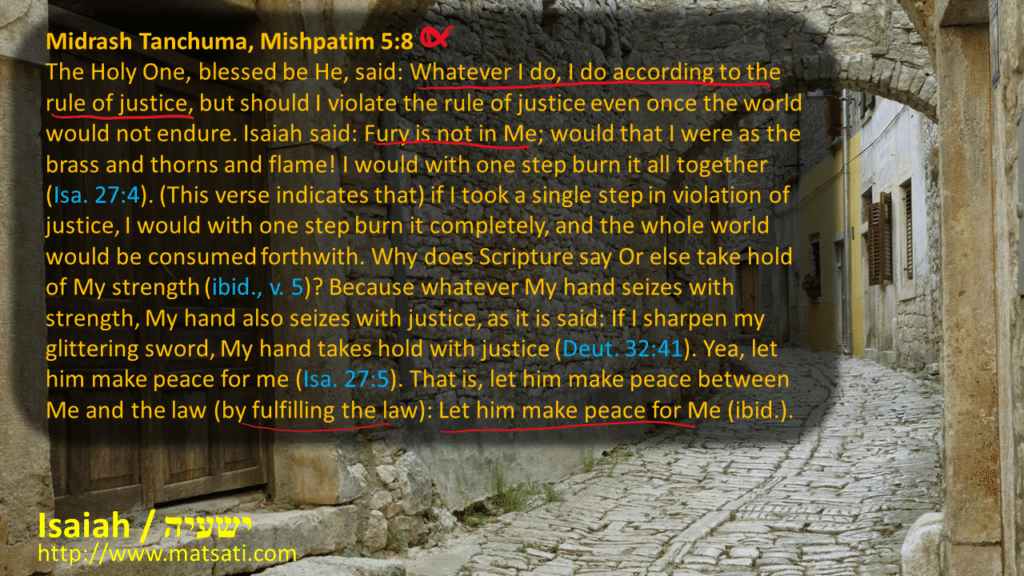
Midrash Tanchuma, Mishpatim 5:8
The Holy One, blessed be He, said: Whatever I do, I do according to the rule of justice, but should I violate the rule of justice even once the world would not endure. Isaiah said: Fury is not in Me; would that I were as the brass and thorns and flame! I would with one step burn it all together (Isa. 27:4). (This verse indicates that) if I took a single step in violation of justice, I would with one step burn it completely, and the whole world would be consumed forthwith. Why does Scripture say Or else take hold of My strength (ibid., v. 5)? Because whatever My hand seizes with strength, My hand also seizes with justice, as it is said: If I sharpen my glittering sword, My hand takes hold with justice (Deut. 32:41). Yea, let him make peace for me (Isa. 27:5). That is, let him make peace between Me and the law (by fulfilling the law): Let him make peace for Me (ibid.).
The Midrash points out that “Fury” is not in the Lord, but that sin leads to punishment. The Midrash also states that justice, if God did not do according to His rule of justice, the world would burn up. This justice is coupled to the covenant that God had made with our fathers, Abraham, Isaac, and Jacob. It is important to also note the Hebrew צדק means “righteousness,” this word can also me “justice.” Understanding this provides more insights into why God’s wrath comes, which is due to men refusing righteousness. This is why we need the צדק righteousness of another, of Mashiakh, God’s holy one! If we are honest about our sins, we all need Mashiakh because of the problem of sin, we need His צדק righteousness! In addition, the rabbis also speak of the concept of keeping God’s mitzvot (commands), walking in God’s holy and righteous ways, and doing so makes peace in the soul with God. Remember how the author of Hebrews described these things according to Hebrews 10:26-31, He says the exact same thing the rabbis are saying here according to the Midrashic commentary.
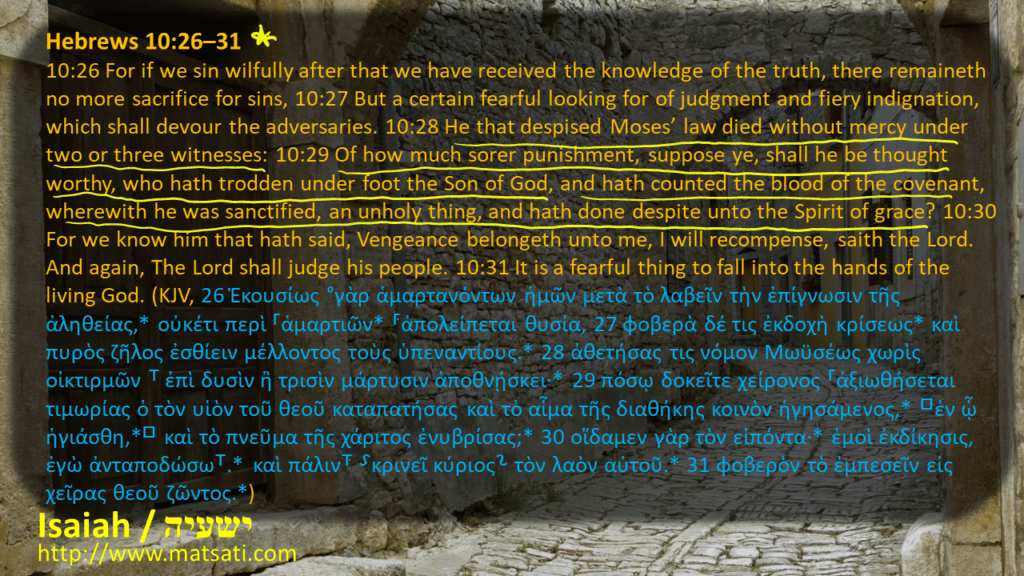
Hebrews 10:26–31
10:26 For if we sin wilfully after that we have received the knowledge of the truth, there remaineth no more sacrifice for sins, 10:27 But a certain fearful looking for of judgment and fiery indignation, which shall devour the adversaries. 10:28 He that despised Moses’ law died without mercy under two or three witnesses: 10:29 Of how much sorer punishment, suppose ye, shall he be thought worthy, who hath trodden under foot the Son of God, and hath counted the blood of the covenant, wherewith he was sanctified, an unholy thing, and hath done despite unto the Spirit of grace? 10:30 For we know him that hath said, Vengeance belongeth unto me, I will recompense, saith the Lord. And again, The Lord shall judge his people. 10:31 It is a fearful thing to fall into the hands of the living God. (KJV, 26 Ἑκουσίως °γὰρ ἁμαρτανόντων ἡμῶν μετὰ τὸ λαβεῖν τὴν ἐπίγνωσιν τῆς ἀληθείας,* οὐκέτι περὶ ⸀ἁμαρτιῶν* ⸁ἀπολείπεται θυσία, 27 φοβερὰ δέ τις ἐκδοχὴ κρίσεως* καὶ πυρὸς ζῆλος ἐσθίειν μέλλοντος τοὺς ὑπεναντίους.* 28 ἀθετήσας τις νόμον Μωϋσέως χωρὶς οἰκτιρμῶν ⸆ ἐπὶ δυσὶν ἢ τρισὶν μάρτυσιν ἀποθνῄσκει·* 29 πόσῳ δοκεῖτε χείρονος ⸀ἀξιωθήσεται τιμωρίας ὁ τὸν υἱὸν τοῦ θεοῦ καταπατήσας καὶ τὸ αἷμα τῆς διαθήκης κοινὸν ἡγησάμενος,* ⸋ἐν ᾧ ἡγιάσθη,*⸋ καὶ τὸ πνεῦμα τῆς χάριτος ἐνυβρίσας;* 30 οἴδαμεν γὰρ τὸν εἰπόντα·* ἐμοὶ ἐκδίκησις, ἐγὼ ἀνταποδώσω⸆.* καὶ πάλιν⸇ ⸉κρινεῖ κύριος⸊ τὸν λαὸν αὐτοῦ.* 31 φοβερὸν τὸ ἐμπεσεῖν εἰς χεῖρας θεοῦ ζῶντος.*)
Can we see how consistent the NT text is with the rabbinic interpretation and the Torah? Here the author of Hebrews describes what happens to the one who disobeys God’s mitzvot. This is referring to those who believe the Word of God, believing in Yeshua, and yet blatantly disobeying God. A comparison is made between what happened in the ancient days under Moshe, and to what happens now in our faith in Yeshua. Wilful sinning is the key phrase here. Something to note about the Torah text, if we carefully examine Vayikra / Leviticus 1-5 in the offerings that are brought to the Tabernacle, the sins are described as accidental and unwittingly committed. There is no sacrifice for willful defiant sinfulness, to assume that one may then bring a sacrifice to receive forgiveness. This same picture is provided to us here in the book of Hebrews, to describe the one who intentionally sins, there is no sacrifice that remains, even for those who believe in Yeshua. The author of Hebrews also verifies the idea that vengeance belongs to the Lord. This is again how the Scriptures and the rabbis define what is taking place here in Isaiah 27:1-6. Rashi goes on to interpret these things according to his commentary on Isaiah 27:4 Part 2.
Rashi on Isaiah 27,4 Part 2
would that I were thorns and briers against [the objects of My] war Against those with whom I wage war, namely Ishmael (ms. Esau). Would that I could visit upon them and the standard of justice would not be able to protest, i.e., that Israel would repent, and that would give Me thorns and briers against the enemies! I would tread upon the standard of justice and I would visit upon them even more and additional punishment over their iniquity, and I would ignite them together. Jonathan rendered it in this manner, as referring to the nations. Our Sages of blessed memory explained it concerning Israel, and it refers back to the vineyard, as follows: I have no wrath Despite all the angers with which this vineyard has provoked Me, I cannot pour out My wrath to destroy it because of the oath I swore to their forefathers. If only it were like days long past! Were it not for the oath, I would be thorns and briers and I would tread upon the vineyard, and I would ignite it together.
Rashi draws out the promises of God to Abraham, Isaac, and Jacob, and the irrefutable nature of these promises for the salvation of His people. This is an important point since if we are all honest about our sins, we all intentionally commit sins. These things define the weightiness of God’s mercy and grace on behalf of His people, just as Rashi is describing here in his commentary. It is interesting how Rashi describes repentance, that the repentance of the people provides thorns and briers against their enemies. The major issue is that when God’s vineyard, an analogy for His people, sinned and was unrepentant, this caused difficulties in how the Lord God would deal with their enemies. God’s mercy allows ample time for repentance! The Lord not instantly killing those who sin is due to His covenant of grace with Abraham, Isaac, and Jacob. This covenant that God made with Abraham was of such tremendous importance that it has shaped the course of this world both in this age and the age to come. We notice in the Torah how through Abraham God would redeem the world, deal with the curse of sin, and fill the earth with His glory. According to the book of Genesis, at the sin of Migdal Bavel (Tower of Babel, see Bereshit / Genesis 11) God divorced the nations. Then the Lord God revealed Himself to Abram in Bereshit / Genesis 12, a man who worshiped false gods (see Joshua 24:2-3 states this explicitly) in the land of Ur. God’s promise included the call to leave his land, his kindred, and his people for the purpose of getting Him away from this place of familiar idolatrous worship. This represents how the Lord God seeks for us to turn from our sinful ways and to start in a new place in serving Him. The promise given was according to Bereshit / Genesis 12:1-3, א וַיֹּאמֶר יְהוָֹה אֶל-אַבְרָם לֶךְ-לְךָ מֵאַרְצְךָ וּמִמּוֹלַדְתְּךָ וּמִבֵּית אָבִיךָ אֶל-הָאָרֶץ אֲשֶׁר אַרְאֶךָּ: ב וְאֶעֶשְֹךָ לְגוֹי גָּדוֹל וַאֲבָרֶכְךָ וַאֲגַדְּלָה שְׁמֶךָ וֶהְיֵה בְּרָכָה: ג וַאֲבָרְכָה מְבָרֲכֶיךָ וּמְקַלֶּלְךָ אָאֹר וְנִבְרְכוּ בְךָ כֹּל מִשְׁפְּחֹת הָאֲדָמָה: “Go from your country and your kindred and your father’s house to the land that I will show you. And I will make of you a great nation, and I will bless you, and make your name great, so that you will be a blessing. I will bless those who bless you, and him who curses you I will curse, and in you shall all the families of the earth be blessed.” The mercy of God was brought to an idolater and He says that He is going to bless him if he would listen and obey. This is the beginning of the special nation to whom all of the world, if willing, would join themselves with as adopted children of God.
Isaiah goes on to say the following according to the TgJ, ה אֹו אִם יַתקְפוּן בְפִתגָמֵי אֹורָיתִי יִתעְבֵיד שְלָמָא לְהֹון מִכְעַן שְלָמָא יִתעְבֵיד לְהֹון׃ 27:5 If they would lay hold on the words of my law, peace would be made with them; henceforth peace would be made with them. ו יִתכַנשוּן מִבֵינֵי גָלְוָתְהֹון וִיתוּבוּן לַאְרַעהֹון תַמָן יִתיַלְדוּן דְבֵית יַעְקֹב יִפְשוּן וְיִסגֹון דְבֵית יִשרָאֵל וְיִמלֹון אַפֵי תֵבֵל בְנֵי בְנִין׃ 27:6 They shall be gathered from the midst of their captivity, and return to their country; there children shall be born to the house of Jacob; they of the house of Israel shall be fruitful, and they shall multiply; their children’s children shall fill the face of the world. (TgJ) Here the Targum writes of the significance of taking hold of God’s word and making it a part of our lives. When we do this, peace is made. We note how Yeshua is described as the living Word of God who came down to earth and tabernacling with us here on earth (John 1:1-14). There is a similar concept here to taking hold of the teachings of Yeshua coupled with faith in our Father in heaven and making the Torah a part of our lives. The commentary Midrash Rabbah on Shemot Parashat 30 part 19 states the following concerning these things.
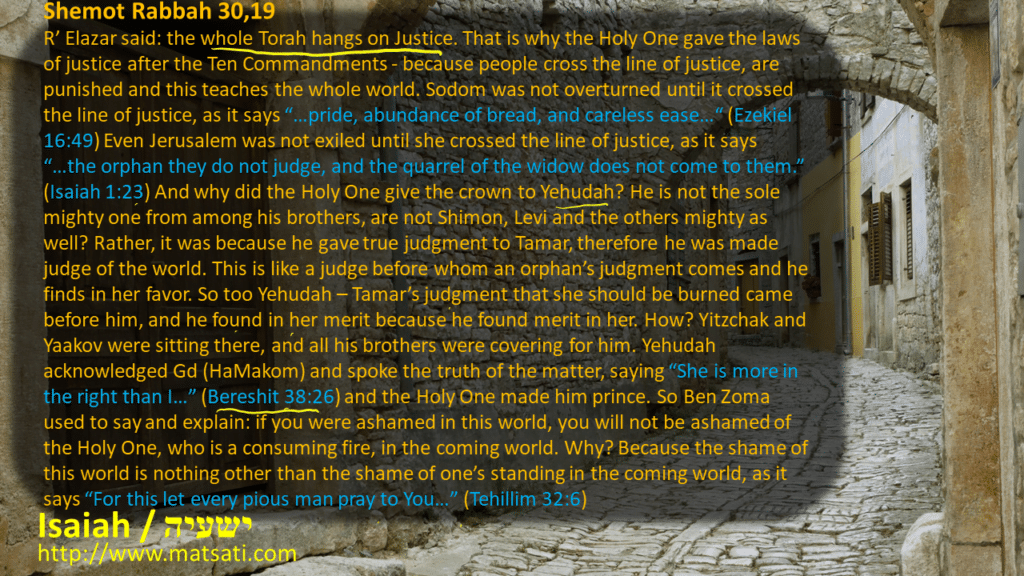
Shemot Rabbah 30,19
אָמַר רַבִּי אֶלְעָזָר כָּל הַתּוֹרָה תְּלוּיָה בַּמִּשְׁפָּט, לְכָךְ נָתַן הַקָּדוֹשׁ בָּרוּךְ הוּא דִּינִין אַחַר עֲשֶׂרֶת הַדִּבְּרוֹת, לְפִי שֶׁהַבְּרִיּוֹת מַעֲבִירִין עַל הַדִּין וְהוּא נִפְרַע מֵהֶם וּמְלַמֵּד אֶת בָּאֵי עוֹלָם, שֶׁלֹא הָפַךְ אֶת סְדוֹם עַד שֶׁעִבְּרָה אֶת הַדִּין, שֶׁנֶּאֱמַר (יחזקאל טז, מט): גָּאוֹן שִׂבְעַת לֶחֶם וְשַׁלְוַת הַשְׁקֵט. וְאַף יְרוּשָׁלַיִם לֹא גָּלְתָה עַד שֶׁעִבְּרָה אֶת הַדִּין, שֶׁנֶּאֱמַר (ישעיה א, כג): יָתוֹם לֹא יִשְׁפֹּטוּ וְרִיב אַלְמָנָה לֹא יָבוֹא אֲלֵיהֶם, וְלָמָּה נָתַן הַקָּדוֹשׁ בָּרוּךְ הוּא כֶּתֶר לִיהוּדָה, וַהֲלוֹא לֹא לְבַדּוֹ הוּא גִבּוֹר מִכָּל אֶחָיו, וַהֲלוֹא שִׁמְעוֹן וְלֵוִי גִבּוֹרִים וְהָאֲחֵרִים, אֶלָּא שֶׁדָּן דִּין אֱמֶת לְתָמָר, לָכֵן נַעֲשָׂה דַּיָּן הָעוֹלָם. מָשָׁל לְדַיָּן שֶׁבָּא דִין שֶׁל יְתוֹמָה לְפָנָיו וְזִכָּה אוֹתָהּ, כָּךְ יְהוּדָה בָּא דִין תָּמָר לְפָנָיו שֶׁתִּשָֹּׂרֵף וְהוּא זִכָּה אוֹתָהּ מִפְּנֵי שֶׁמָּצָא לָהּ זְכוּת. כֵּיצַד הָיוּ יִצְחָק וְיַעֲקֹב יוֹשְׁבִים שָׁם וְכָל אֶחָיו וְהָיוּ מְחַפִּין אוֹתוֹ, הִכִּיר יְהוּדָה לַמָּקוֹם וְאָמַר אֲמִתַּת הַדָּבָר, וְאָמַר (בראשית לח, כו): צָדְקָה מִמֶּנִּי, וַעֲשָׂאוֹ הַקָּדוֹשׁ בָּרוּךְ הוּא נָשִׂיא. וְכֵן הָיָה בֶּן זוֹמָא אוֹמֵר וְדוֹרֵשׁ נִתְבַּיַּשְׁתָּ בָּעוֹלָם הַזֶּה אֵין אַתָּה מִתְבַּיֵּשׁ מִן הַקָּדוֹשׁ בָּרוּךְ הוּא לָעוֹלָם הַבָּא שֶׁהוּא אֵשׁ אֹכְלָה, לָמָּה, שֶׁאֵין בָּשְׁתּוֹ שֶׁל הָעוֹלָם הַזֶּה כְּלוּם אֶלָּא בּשֶׁת עֲמִידָתוֹ שֶׁל הָעוֹלָם הַבָּא, שֶׁנֶּאֱמַר (תהלים לב, ו): עַל זֹאת יִתְפַּלֵּל כָּל חָסִיד אֵלֶיךָ וגו’. R’ Elazar said: the whole Torah hangs on Justice. That is why the Holy One gave the laws of justice after the Ten Commandments – because people cross the line of justice, are punished and this teaches the whole world. Sodom was not overturned until it crossed the line of justice, as it says “…pride, abundance of bread, and careless ease…“ (Ezekiel 16:49) Even Jerusalem was not exiled until she crossed the line of justice, as it says “…the orphan they do not judge, and the quarrel of the widow does not come to them.” (Isaiah 1:23) And why did the Holy One give the crown to Yehudah? He is not the sole mighty one from among his brothers, are not Shimon, Levi and the others mighty as well? Rather, it was because he gave true judgment to Tamar, therefore he was made judge of the world. This is like a judge before whom an orphan’s judgment comes and he finds in her favor. So too Yehudah – Tamar’s judgment that she should be burned came before him, and he found in her merit because he found merit in her. How? Yitzchak and Yaakov were sitting there, and all his brothers were covering for him. Yehudah acknowledged Gd (HaMakom) and spoke the truth of the matter, saying “She is more in the right than I…” (Bereshit 38:26) and the Holy One made him prince. So Ben Zoma used to say and explain: if you were ashamed in this world, you will not be ashamed of the Holy One, who is a consuming fire, in the coming world. Why? Because the shame of this world is nothing other than the shame of one’s standing in the coming world, as it says “For this let every pious man pray to You…” (Tehillim 32:6)
Here the Midrash explains how the Torah of God hangs on Justice and goes on to describe why the Torah was written in the way that it was written. Injustice is a primary principle taught in the Torah which is connected to pride and trusting in wealth, the very same things that Isaiah has been pointing out in his book thus far. Based upon the Midrash, the concept of Justice takes a formidable position in the Torah and all of Scripture. When we consider the injustices that take place in this world, even what Yeshua says according to the beatitudes, we see how injustice is being perpetrated upon the people of God and the blessedness of those who continue to walk in God’s holy and righteous ways! Rashi describes these things in the following way.
Rashi on Isaiah 27,5 Part 1-2
או יחזק במעוזי. או ל’ אם כמו או נודע כי שור נגח הוא (שמות כ״א:ל״ו) או יחזיק עמי במעוזי שלא יבקש מעוז אלא מעוזי אז יעשה שלום לי להניח דעתי ואפי שמתקשקשת בי על שאיני נוקם בצרי ואנקם בהם: If they would grasp My fortress (אוֹ), lit., or they would grasp My fortress,) an expression of ‘if.’ Comp. “(Ex. 21:36) If (אוֹ) it was known that he was a goring ox.” If My people grasp My fortress, i.e., My Torah, that they seek no other fortress but My fortress, then they shall grant Me peace, to calm My thoughts and My ire which trouble Me because I do not avenge Myself upon My adversaries, and I will, indeed, take revenge from them. שלום יעשה לי. ממדת הדין שלא יוכל לקטרג ולומר מה נשתנו אלו מאלו: they would make peace for Me from the standard of justice, so that it will be unable to accuse and to say, “Why are these different from those?” (I.e., Why are the Jews different from the other nations?)
We note something here, that this concept of justice is the divine standard that separates us from others, and from the nations. The question we ask ourselves is “What makes us different from others?” Here Rashi describes these things as taking hold of the fortress of God and directs our attention to the fortress as being God’s Torah. The reason this is so the commands protect us, they shield us from sin. The major issue is how sin doesn’t come from outside, but from within, from the conception that takes place in our hearts. This is what Paul was arguing concerning sin and the Torah, in the book of Romans. What miserable men we are because of our sin! This is why we need the Torah centric principle in our lives, of God dwelling in our midst, to change us from the inside out! This is how our faith in Yeshua unleashes the power of God to transform our lives. This is how we are different from the other nations. How we are different from those who do not know God or His Holy and righteous ways! We also note that the way of justice allows for the judge to take revenge. The judge is God and His holy Word. We are not called to be judge, jury, and executioner in this regard. We are called to be merciful, and gracious even to our enemies praying for our enemies so that their hearts will be changed in a very powerful way by God and His presence in their lives! The mercy of God is illustrated in Isaiah 27:6 . ו יִתכַנשוּן מִבֵינֵי גָלְוָתְהֹון וִיתוּבוּן לַאְרַעהֹון תַמָן יִתיַלְדוּן דְבֵית יַעְקֹב יִפְשוּן וְיִסגֹון דְבֵית יִשרָאֵל וְיִמלֹון אַפֵי תֵבֵל בְנֵי בְנִין׃ “They shall be gathered from the midst of their captivity, and return to their country; there children shall be born to the house of Jacob; they of the house of Israel shall be fruitful, and they shall multiply; their children’s children shall fill the face of the world.” (TgJ) This mercy that God shows to us in His Son, we too are to demonstrate this to others due to our being God’s sons through faith!
